CyberKnife CEnter Of Miami
Patient Success Stories
Request an Appointment
Cancer Treatment Center in Miami, FL
Patient Success Stories
As a result of the compassionate care we deliver, we develop lasting relationships with our patients. Many times we hear from our patients about how the doctors and staff at CyberKnife Miami have helped them. For those of you we hear from, we thank you for passing along your kind words. Here are some of our favorite quotes and stories of survival:
“I had lung cancer and was given 3 months to live. That was 5 years ago, and now my life expectancy is the same as any person without cancer.”
“My brain tumors dissolved while I got on with my normal routine of life, and if the tumor comes back, they zap it again and it disappears.”
“With traditional spinal surgery, they would have cut my back open to remove the tumor, which could have left me paralyzed. With the CyberKnife, they just zapped the tumor and 30 minutes later I went to lunch.”
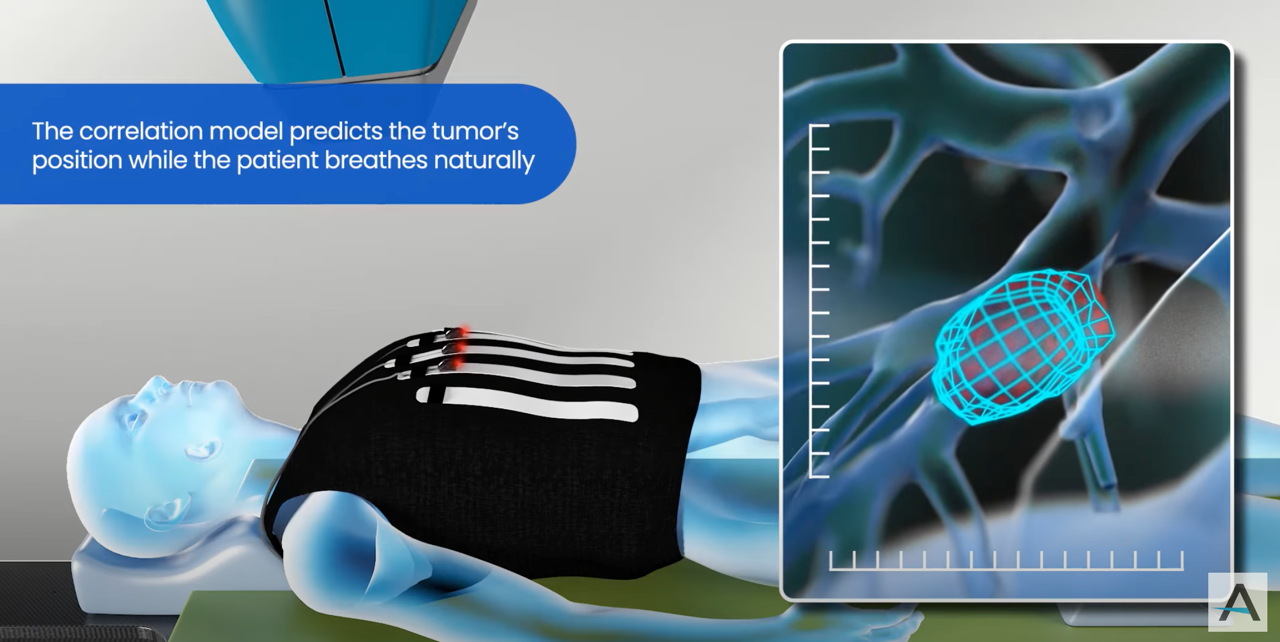
Video Testimonials
Former Top Gun Fighter Pilot Choses CyberKnife for Prostate Cancer
CyberKnife Treatment vs Surgery for Prostate Cancer
Listen to Our Patient Testimonials
Beating Bone Cancer that Spread to the Lung: José’s Story
Beating Metastatic Ovarian Cancer: Leonor’s Story
Beating Colon Cancer that Spread to the Liver: Ricardo’s Story
CyberKnife Testimonials
Deborah's Story: Curing Trigeminal Neuralgia Pain with CyberKnife

“I don’t know where I’d be right now if my husband hadn’t seen that TV Ad about CyberKnife curing Trigeminal Neuralgia pain with one treatment.”
Like many patients with Trigeminal Neuralgia Deborah’s symptoms started with mild sensitivity while eating, drinking or brushing her teeth so she thought it was a dental problem.
“The pain would go away for awhile and come back with a vengeance. It hits out of the blue and shuts you down.”
X-rays ruled out dental problems but her dentist said she had classic Trigeminal Neuralgia symptoms and recommended she see a neurologist.
Often called the suicide disease, Trigeminal Neuralgia is a facial nerve disorder involving the Trigeminal Nerve in the head, which can cause constant intense facial pain. It’s more common as we age but Deborah was only 40 when it began.As recommended, Deborah saw a neurologist, who ordered an MRI, and while the test didn’t confirm Trigeminal Neuralgia, she prescribed Tegretol, often the first drug used to calm or block nerve pain.
“Tegretol worked for awhile but the pain came back stronger so each neurologist I saw kept increasing the dosage which made me so tired I couldn’t get out of bed and eventually Tegretol stopped working. I was in horrific pain every day and couldn’t imagine going through life like this.”
Deborah saw many doctors, talked to everyone she could and learned there were surgical procedures she could try including Microvascular Decompression which involves making an incision behind the ear to relocate or remove blood vessels that are pressing on the Trigeminal Root to stop the pain.
Another treatment option is called a Balloon Compression, in which a hollow needle is inserted through the face and into the base of the skull to destroy nerve fibers and reduce pain.“I learned some people were helped by these treatments and others weren’t. It was very confusing. Plus they’re invasive and there’s no guarantee they’ll work.”
Deborah says, “Not once did CyberKnife come up as a non-invasive treatment option. Luckily my husband Joey saw CyberKnife Miami’s TV Ad. We immediately went on-line to the CyberKnife Center of Miami’s website, watched videos, read patient success stories and called for an appointment.”
The CyberKnife Radiosurgery System works by delivering high doses of very defined radiation beams from multiple angles with extreme accuracy targeting the Trigeminal Nerve, desensitizing the nerve.
“We’d never heard of CyberKnife or the CyberKnife Center of Miami. There was only one location and it wasn’t affiliated with a hospital so we were skeptical, but I thought I have nothing to lose.”
The CyberKnife Center of Miami is the only free standing CyberKnife center in South Florida. Any patient can go directly there for treatment and any doctor can send patients to CyberKnife Miami. Patients come from all over the world to be treated for nerve disorders, plus cancerous and non-cancerous tumors.
“My husband called the center because the pain was so bad I couldn’t talk. We were amazed at how helpful the staff was. They got me in right away. They explained everything in detail and did everything for me. They made it so easy. You pull up into their parking lot and go right in. It’s not like going thru the maze of a big medical center. They even set up my appointments for a contrast MRI along with a CT scan and explained the extreme importance of being able to see exactly and precisely where the radiation should be targeted. No other doctor even mentioned I needed that.”
CyberKnife Miami’s Medical Director and Board Certified Radiation Oncologist, Dr. Mark Pomper, along with the center’s medical physicists mapped out her treatment plan.
Dr. Pomper says, “When I first saw Deborah she could barely talk or move because it would bring on such horrific pain. She was incapacitated.”
“While there are no guarantees, Dr. Pomper says, CyberKnife has an 80-percent success rate with less than a 1-percent chance of side effects, which can include temporary or permanent facial numbness or paralysis.”
Deborah says, “The treatment took 45-minutes. Afterwards I felt a little queasy, had a slight headache, but by the next day, it was like a miracle. I was talking and feeling good. I had a couple of pain episodes but by the second week it was completely gone.”
Dr. Pomper says, “Patients suffering from Trigeminal Neuralgia should always consider alternative options to surgery. After trying medication, ask your doctor, is there a non-invasive treatment available? Typically, patients need only one CyberKnife treatment. If the pain returns, a second treatment may be considered but we’ve been very successful with just one treatment.”
Deborah says, “If it wasn’t for that TV Ad I’d still be going from doctor to doctor trying to find an answer. The whole healthcare system is scary. You have to educate yourself and don’t just do what your doctors say.”
“I felt useless, spent a lot of time in bed and was forced to miss a lot of work. I lived in pain for two-and-a-half years. I understand why it’s called the suicide disease and that’s why we tell everyone we can about CyberKnife.”
“I’m extremely fortunate. I don’t take small things in life for granted any more. This week there was a birthday party which I would have missed if not for CyberKnife. Nor could I have gone to my son’s many basketball games. I’ve got my life back and my family has me back.”
Talk to our Trigeminal Neuralgia Experts at CyberKnife Miami to see if you are a candidate for CyberKnife Radiation Therapy 305-279-2900 and go to our website www.cyberknifemiami.com
Angie's Story: Treating Spinal Tumors With CyberKnife

As a TV news anchor and reporter, 37-year-old Angie Perez is used to working long hours and hitting the red carpet in stilettos covering entertainment news, plus modeling.
“I’m not one to complain, but once in a while I’d get back pain that I blamed on high heels, being on my feet a lot and exercising too much but it would go away with over the counter pain meds.”
“They told me there was no danger to the spine and that the spinal tumors weren’t doing immediate damage.”
Angie was prescribed physical therapy to strengthen her spine and pain medication.
“Nothing worked. Instead I got hives and swollen eyes. I couldn’t go on the air. It was affecting my career. The pain was so bad in my legs that natural childbirth was a walk in the park.”
Angie continued seeing doctors and was wrongly told by one that the spinal tumors were cancerous.
In the meantime, the numbness and weakness in Angie’s legs was getting worse. “I feared permanent nerve damage and ending up in a wheelchair if this went on much longer.”
Doctors finally did surgery placing three titanium rods in Angie’s back to stabilize her spine. She then received treatment with CyberKnife Radiation Therapy to one of the spinal tumors, which was getting bigger. The CyberKnife delivers a high dose of radiation with pinpoint accuracy to the tumor, causing it to shrink, while leaving surrounding tissue unharmed.
“The biggest mistake was not treating me right away. I walked around for six years with numb legs. Sometimes I couldn’t get out of bed and had to crawl to the bathroom.”
“Within 5-months after treatment I was back in 5-inch heels.”
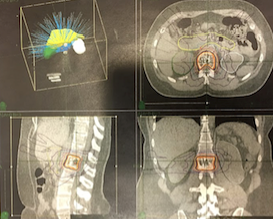
However, a follow up visit discovered Angie’s other spinal tumor was growing dangerously bigger. Radiation Oncologist, Dr. Mark Pomper used CyberKnife again to treat it at the CyberKnife Center of Miami. Dr. Pomper says, “CyberKnife Radiation Therapy is a great option for spinal tumors because it’s non-invasive and, if possible you should always try non-invasive treatments first.” The CyberKnife’s radiation beams kill tumor cells making it less likely they’ll start growing again.

Angie had a very good response to CyberKnife also known as Stereotactic Body Radiation Therapy or SBRT.
Dr. Pomper says, “Studies show CyberKnife is often quite successful in achieving complete pain relief. When I saw Angie last, she looked like a different person. She was back on her feet and not having much discomfort. We’re hoping not to see her again.”
Dr. Pomper says if a doctor recommends surgery or other types of radiation for a spinal tumor, get a second opinion because most people aren’t aware of CyberKnife’s capabilities, excellent results and how easy it is for the patient, requiring fewer treatments with no down time.
Angie’s says, “When all hell was breaking loose, I thought this can’t kill me, my life isn’t complete yet. I just wanted to get on with my life and back to work full time.”
“Right now I’m feeling good. I’m walking around airports, carrying luggage and wearing stilletos again.”
“I’m grateful and blessed to have become an American citizen and be treated in this country. If I’d still be in Venezuela, I don’t know where I’d be now.
Helene's Story: CyberKnife Can Successfully Treat Metastatic Ovarian Cancer

“I woke up and couldn’t breathe, I felt like I was suffocating,” says Mrs. Helene Rich. I sat up, slammed my fists into my chest and pounded it until I started breathing again. Mrs. Rich had suffered from pneumonia 3 years prior and thought the pneumonia was back.
Upon being admitted to the hospital, many tests were performed to determine why she had this frightening breathing attack and the results showed that there were cancer cells in her lungs. The cancer cells were interfering with the normal functioning of her lungs and she wasn’t getting the necessary oxygen she needed to breathe. “I was feeling a lot of pressure in my chest and they had to remove 1 liter of fluid from my lungs. After that I felt much better,” she said.
Her Oncologist recommended chemotherapy as the best treatment option for the cancer cells in her lungs. She would require chemo treatments for 3 months and chose to live at a rehab center near her Oncologist because she lived far from the hospital. “I stayed at the rehabilitation center for 114 days until the chemo was finished. Living alone, it was better for me to be at a place where I could receive help in case I felt sick from the treatment. I have 4 children but I didn’t want to stay with them and be a burden to anyone,” said Mrs. Rich.
After the chemo treatments were completed, a PET scan was taken to determine if the cancer cells in her lungs were gone and to check the rest of her body for any additional evidence of cancer. “I was told that the cancer cells in my lungs were gone but the scan did show that there were spots on my ovaries and I would need additional treatment”, she said.
“The thought of more treatment was scary but I try to put a smile on my face, be as brave as possible and keep on going”.
The cancer cells in her lungs turned out to be ovarian cancer cells and since the cancer was also found in her ovaries and the surrounding tissue, Mrs. Rich was diagnosed with Metastatic Ovarian Cancer. This means that her ovarian cancer cells spread to her lungs before she was diagnosed.
“Back to the Oncologist I went to talk about what would come next”, she said. The Oncologist recommended a radical hysterectomy, surgical removal of the ovaries, or she could have standard radiation treatments which can take several months to complete. “I’m not having surgery, said Mrs. Rich, nor do I want to go through radiation treatments. At my age, undergoing surgery will not have a positive outcome and I will not put myself through that”.
While in search of an alternative treatment, a friend of Mrs. Rich happened to work for a doctor who sends his cancer patients to the CyberKnife Center of Miami where they use a non-invasive, painless treatment called CyberKnife Radiosurgery and suggested she consult with them.
CyberKnife Radiosurgery is FDA approved and is a non-invasive, painless procedure that uses very precise radiation to shrink or dissolve tumors with pinpoint accuracy and can be a great alternative to surgery. It safely delivers radiation directly into the tumor sparing healthy surrounding tissue. CyberKnife can also treat many lesions that would be considered inoperable or untreatable giving many patients new hope when there was none.
Mrs. Rich consulted with Mark Pomper, MD, a Board-Certified, Radiation Oncologist and Medical Director at CyberKnife Center of Miami. “Mrs. Rich came to me with a diagnosis of metastatic ovarian cancer that was currently located in the pelvic area. CyberKnife can be a very effective treatment for this type of cancer because it actively spreads and with CyberKnife if the lesions return, we can zap them again no matter where they are located in the body”, said Dr. Pomper. Mrs. Rich is strong and basically in good health and she should tolerate this procedure well.
“I had five CyberKnife treatments over ten days and didn’t feel anything,” said Mrs. Rich. “I wasn’t nervous, I laid on the table, listened to music and relaxed during my 45 minute treatment. After my treatments I was able to go out for lunch with my friend, walk the mall or do anything I wanted to do. It is amazing! I felt fine in fact, I never even experienced any fatigue”.
After completing her five CyberKnife treatments, a second PET scan was done to determine if the area of the original cancer was gone or had shrunk. The results showed that the lesions shrunk and were much smaller. “Often after we irradiate tumors with CyberKnife they shrink and over time they are completely gone, says Dr. Pomper. It is our hope that the tumor in Mrs. Rich’s pelvis will dissolve completely.
“The new PET scan also showed that the cancer had spread to the abdominal wall which is a frequent area of return for ovarian cancer, said Dr. Pomper, but we can treat them and we are hopeful that they will dissolve”.
Recently, Mrs. Rich began another round of CyberKnife treatments to address the abdominal wall tumor. She will again have five treatments and is expected to do very well. Dr. Pomper explains that metastatic ovarian cancer is an incurable cancer but because CyberKnife technology is so precise, safe and effective, it enables us to treat the tumors if, or when, they recur giving our patients an extended and very good quality of life.
Mrs. Rich is doing very well. She is living her life to the fullest, has a wonderful spirit and such a positive attitude. She enjoys spending time with her 4 children and her grandchildren and loves going to Festival Flee Market with “The Girls”. She speaks highly of Dr. Pomper raving about how wonderful he is. She says, “He is very caring, thorough, and makes me feel so comfortable”. The staff at CyberKnife is also terrific. Everyone is so attentive and friendly; they take wonderful care of me.
When I first met Dr. Pomper he asked me how I felt when I was told that I should have surgery to remove my ovaries and I told him I was opposed to it. I was feeling good and I didn’t want to put myself through invasive surgery. I knew I would be in pain from the surgery and that recovery could be difficult. Dr. Pomper told me all about the benefits of CyberKnife, painless, no cutting, no anesthesia, no hospital stay and how CyberKnife Therapy can do the same thing as surgery, get rid of the tumors. This sounded so much easier than the other difficult treatment options that were offered to me. Another doctor even told me that CyberKnife would never work for me and that surgery was my only option, but why would I chose surgery when CyberKnife can non-invasively get rid of my tumors?
“I’m enjoying my life, I’m not in pain, I have a good appetite, and I know that when, or if, my tumors come back they can be treated. I know that I made the right decision by refusing the surgery”, said Mrs. Rich.
“I tell everyone about CyberKnife. I tell them how important it is to know that you have choices when it comes to cancer treatments. I tell them not to decide what to do until having a consultation with the doctors at CyberKnife Miami because in my opinion, if you are a candidate, CyberKnife is better than anything!”
If you have been diagnosed with Metastatic Ovarian Cancer or have failed other cancer treatments contact our office to set up a consultation with one of our Board-Certified, Radiation Oncologists to learn if you are a candidate for CyberKnife. Call us today at 305-279-2900
Maria's Brain Tumor Successfully Treated With CyberKnife

“I wasn’t sick a day in my life. Never even took an aspirin until I started getting headaches that didn’t go away.”
60-year Maria Nin thought her headaches were caused from working long hours on the computer, or perhaps she needed glasses and went to an eye doctor who ruled out both problems and sent her to a neurologist.
“The neurologist thought I was developing migraines and scheduled an MRI. When he said, you have a brain tumor, called a Meningioma behind my left eye, I was completely paralyzed and devastated. Even though it was benign, my husband and I were crying.”
The plan was to wait a few months and follow up with a second MRI, which revealed the tumor was growing and something needed to be done. That’s when Maria’s husband, a retired doctor, insisted she see his longtime friend Board Certified Neurosurgeon Dr. Aldo Berti.
“As time went on my headaches got so bad, I was throwing up. I had to quit work and most of my life was spent in bed. It was scary but Dr. Berti was very reassuring. He said you have options and that was a big relief. He told us about CyberKnife.”
Treatment options for growing brain tumors include, surgery to remove them or radiation therapy like CyberKnife. The CyberKnife uses highly focused and precisely aimed radiation beams that shrink or dissolve the tumor while sparing surrounding healthy tissue.
Dr. Aldo Berti says, “Surgery was not an option for Maria because of where the tumor is located and why would you do surgery when there is an excellent non-invasive treatment option? Because the tumor was growing, you don’t want to wait until it gets out of hand. The best thing is to treat it non-invasively avoiding the risks of open surgery.”
CyberKnife Stereotactic Radiosurgery (SRS) has a very high success rate for treating brain or spine meningiomas. About 95-percent of meningiomas stop growing after one treatment or a small series of treatments.
“Dr. Berti told me the radiation only goes to the tumor, it doesn’t damage anything else in the brain and you won’t have any side effects. He said you’re going to be okay and I said okay, let’s do it.”
Maria’s next step was meeting Board Certified Radiation Oncologist, Dr. David Huang at the CyberKnife Center of Miami for treatment.
“First, I went to CyberKnife Miami’s website, saw all the videos, read everything and told my husband this looks good. You go in, get treated, walk out, you can even drive home and do whatever you want. It’s amazing. I was very excited”
Left untreated Maria’s tumor could have caused vision loss and brain damage but Dr. Huang assured Maria that wasn’t going to happen to her.
Dr. David Huang says, “Maria is the perfect candidate for CyberKnife Radiosurgery. There’s a good chance it will only require one treatment for the tumor to shrink. Should it start to grow again, which is highly unlikely, we can treat it again. She had a quick response to the first CyberKnife treatment. Within months the tumor was a lot smaller and continues shrinking. She has an excellent prognosis.”
Maria says, “I suffered almost a year, but soon after the CyberKnife treatment my headache was gone. I’ve never had another one.”
“A lot of people don’t know CyberKnife exists. Doctors should tell patients about it and give them that option. For me it was like a miracle.”
“Plus, the staff at the Cyberknife Center of Miami is awesome. It’s quiet, private and everyone makes you feel so comfortable. They take all your fears away.”
“Dr. Huang and Dr. Berti are excellent. They both told me the same thing. CyberKnife is a great non-invasive option and you’re going to be fine.”
“After being diagnosed with a brain tumor, I thought my life was over but not anymore. Now I look forward to a long life with my family. I’ve been reborn thanks to CyberKnife. I want the world to know I’m doing great and we tell everyone we can about CyberKnife Miami.”
If you have a brain tumor talk to our experts at CyberKnife Miami to see if you’re a candidate for CyberKnife therapy. 305-279-2900 and visit our website www.cyberknifemiami.com
Howard's Story: Prostate Cancer "No One Ever Told Me About CyberKnife"
Since 2011, Howard Maharaj had an elevated PSA score but was reluctant to go to a doctor to have his prostate checked. “I was in denial, said Howard.” It wasn’t until 5 years later in January of 2016 while experiencing frequent urination that woke him 2 –3 times a night, he decided it was finally time to see a Urologist.”
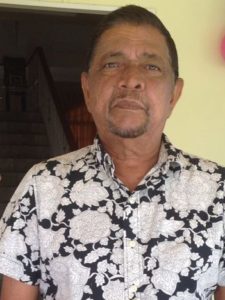
“When I was diagnosed with prostate cancer, I thought my world was coming to an end. I spoke with many men about their prostate cancer treatments and 95% told me that they had bad experiences with open surgery (prostatectomy) or standard radiation and many felt very sick from their treatments.” Those who elected surgery had long recuperations and some experienced side effects including frequent urination and ED, erectile dysfunction.
Men who chose standard radiation had 42 treatments over several months and were feeling so tired that they were unable to enjoy a quality of life. “I knew that neither of these treatment options were for me, said Howard. I didn’t know what I was going to do.”
In Trinidad Tobago, West Indies where Howard resides, there are limited treatment options available for prostate cancer even though they have the highest incidence of prostate cancer in the Caribbean. Howard realized that he needed to search outside of the Caribbean and went to Canada where he once lived in search of newer treatments. “Again, the only treatments I heard about were surgery and standard radiation. It wasn’t until I spoke with my cousin in New Jersey that I learned about CyberKnife Radiation Therapy and it sounded very interesting. No one ever told me about CyberKnife.”
CyberKnife, also known as SBRT (Stereotactic Body Radiation Therapy) is the most advanced radiosurgery technique available for treating prostate cancer. It is non-invasive and reduces the risk of side effects that can result from traditional treatments such as surgery and standard radiation.
With CyberKnife Therapy you typically undergo 5 treatments over about 10 days, compared to 42 treatments over several months with standard radiation. It dissipates tumors with pinpoint accuracy and is less likely to harm surrounding healthy tissue. There’s no cutting, incision, blood, anesthesia, pain, and no recovery time.
Data from a recent study on CyberKnife treatment for low-risk prostate cancer showed of the 230 men who participated in the study, 98.4 percent had local disease control 10 years after receiving SBRT.
After learning about CyberKnife, Howard knew this was the treatment he would be most comfortable with.
He researched the internet to find the closest CyberKnife location to Trinidad and found CyberKnife Center of Miami. “I immediately went to their website to learn more and I read and watched the wonderful patient success stories. I was convinced this is where I needed to go for my treatment.”
“I called the Center and spoke with Maria who had me send my records to see if I was a candidate for CyberKnife and indeed I was! Maria made all of my travel plans, including booking a hotel within walking distance of the Center. Maria was wonderful, she is a very caring person and made me feel very comfortable.”
Just 1 month later, on December 11, 2016 Howard began a series of 5 treatments, 1 treatment every other day, under the care of Dr. Mark Pomper, Radiation Oncologist & Medical Director at CyberKnife Miami.
“Howard was an excellent candidate for CyberKnife says Dr. Pomper. He was in good health and while his PSA levels continued to rise, his MRI and bone scan showed that the tumor was localized to his prostate so we weren’t worried that the cancer had spread to other areas. The procedure went very smoothly, and he tolerated it well enough that he was able to go about his life and enjoy Miami.”
Howard’s treatments were completed within 10 days, the only side effect was a little constipation which didn’t last very long and some fatigue. “I felt nothing during the treatment, in fact I rested, listened to music and found it relaxing.” He felt so good throughout his treatments that he was able walk to and from treatments, enjoy a few beers with friends after 1 treatment and enjoy some sightseeing around Miami. Just three weeks after completing his treatments, he already felt better and stronger and no longer woke up during the night to urinate.
Howard says that the team at CyberKnife Miami was so accommodating. “Dr. Pomper is very compassionate, he explained everything very professionally and he addressed my fears because I was very nervous.” Howard even referred to Dr. Pomper as an “Ambassador” who should be commended! He also worked with Mario Tobon, a Radiation Therapist at CyberKnife Miami who helped him through his treatments and says he’s a fine gentleman who should be commended for his clever personality. “When you’re a medical patient you need upbeat people around you to keep your spirits high and feel comfortable while being treated, says Howard.”
Two months after the CyberKnife treatment Howard went for another PSA test and the results showed his levels dropped to 1.1 ensuring that the treatment was successful! “I was so excited about the news and my new healthy life that I called everyone! When I was first diagnosed with cancer I felt a sense of emptiness worrying whether or not I would beat this and was so concerned that my life could be coming to an end. Now I’m on top of the world, my PSA levels went from 15.1 down to 1.1, it doesn’t get much better than that!”
Cynthia's CyberKnife Story: Successfully Treated Arteriovenous Malformation
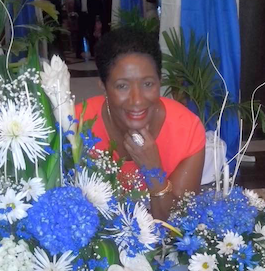
“It started with tingling and numbness on the left side of my face and ringing in my ears. Gradually the pain got so bad I actually saw stars and couldn’t feel my legs. I hurt from my head to the bottom of my feet.”
“I blamed it on stress, working too hard, getting older, even my shoes. I love shoes and gave away all my pretty shoes for flats.”
Over a two year period Cynthia, a resident of Saint Lucia Island in the Caribbean went from doctor to doctor, going through all kinds of tests, when finally an MRI she had done in South Florida discovered the culprit, a tangled mass of blood vessels in her brain known as an AVM or Arteriovenous Malformation.
AVM affects less than 1-percent of the population. Most people are born with them but occasionally they form later in life.
Once diagnosed they can be treated by restoring normal blood flow to the brain. Left untreated they can cause bleeding, brain damage or stroke.
“When I first got the results it was scary because it’s like a balloon inside my brain that’s been growing for years and could burst any time.”
Cynthia’s doctor in St. Lucia recommended she stay in the U.S. and get treated right away but it wasn’t easy.
“It took weeks to get an appointment and when I finally did, one neurosurgeon, even though he had my MRI and knew what I had, wanted to run more tests costing close to 40-thousand dollars at my expense because I don’t have U.S. medical insurance.”
“Another doctor said there was nothing he could do for me and two others suggested watching and waiting, and if I get a brain bleed go to the emergency room.”
“Can you imagine, I could have had a brain bleed, ended up with brain damage or a massive stroke.”
In many cases AVM’s are treated with surgery to remove the mass or doctors use a technique called Embolization, which requires injecting a liquid adhesive into the AVM to try and block it off.
Cynthia didn’t like the risks that came with those options, including, infection, a brain bleed and stroke. She contacted Board Certified Neurosurgeon Dr. Mark Shaya with the Neurosurgical Institute of Florida. He specializes in CyberKnife Radiosurgery and recommended she go to the CyberKnife Center of Miami for treatment.
“Right away I went to CyberKnife Miami’s website, read all about how the CyberKnife works and read the patient success stories. I instinctively knew this was what I wanted to do.”
“Dr. Shaya said it was the best and easiest option for me with no down time and probably could be done with just one treatment. Plus he did everything for me. He called CyberKnife Miami, set up the appointment and even offered to help me set up a payment plan since I don’t have insurance.”
Using image-guidance and computer controlled robotics, the CyberKnife used the most precise high dose radiation delivering beams from hundreds of directions to the AVM gradually shrinking it and reducing the long term risk of brain bleeding and stroke.
“The staff at CyberKnife Miami is so welcoming. They make you feel relaxed, not scared. You don’t feel like you are having a medical treatment. I actually enjoyed being there.”
Cynthia also met Board Certified Radiation Oncologist, Dr. David Huang at CyberKnife Miami, who worked with Dr. Shaya and the medical physicists, to map out her treatment plan.
Dr. Huang says, “Most patients respond very well to CyberKnife treatments yet a lot of AVM’s are still treated with brain surgery, which is more risky and costly. But that’s changing as more doctors learn about CyberKnife and patients are asking for it. I believe it will become the standard treatment for most AVM’S.”
Dr. Huang adds, “Cynthia’s AVM was big and deep in the brain, in an area that controls vision and movement. It would be difficult to remove it without causing some damage. CyberKnife Radiation Therapy doesn’t cause any harm, there’s no risk of infection and can shrink the AVM, so that it is no longer a threat.”

Nothing is required of patients during treatment. Come dressed comfortably, bring music to listen to and relax.
“The treatment took about an hour and I didn’t feel a thing. I almost fell asleep on the table while the CyberKnife did its work. When I got off the table, it was like nothing happened. It didn’t interrupt my life in any way.”
Dr. Shaya says, “Cynthia did phenomenally well and her symptoms resolved within a week. We are checking MRIs of the brain every 6 months as her AVM is slowly disappearing. The risk of this AVM bleeding spontaneously is decreased significantly as well.”
“Her prognosis is excellent, says Dr. Huang. There’s an 80-percent or better chance she’ll have no problems and if she does we can re-treat the AVM with CyberKnife again, but I doubt that’ll be necessary.”
Cynthia says, “Everything has improved. I have no more facial or foot pain or ringing in my ears. I do everything I did before.”
The 58-year-old retiree plans on traveling and spending more time with family and grandkids. When deciding on treatment options she says, “Do your research. Don’t just do what the first doctors tell you to do. Get a second or even third opinion. With CyberKnife there’s nothing to be afraid of. It allows you to go about your work and daily life as though nothing happened.”
“I just wish I had all my pretty shoes back because now I can wear them again.” (She Laughs)
Don's Story: Prostate Cancer "Why I Chose CyberKnife Over Surgery"
“I was numb for 24-hours after hearing cancer in the same sentence as my name.”

When 55-year-old Don Kearns landed in a urologists office with kidney stones the doctor also suggested a PSA test for prostate cancer since he’d never had one.
“I said no way. I have no symptoms and there’s no family history of prostate cancer.”
The doctor convinced Don and discovered his PSA level was high, recommended a biopsy which revealed prostate cancer.
“It hit me like a ton of bricks. I immediately started researching what that meant and thought, I’m a dead man. My brother had kidney cancer ten years ago. He’s okay but my father died of lung cancer at 55 and I was turning 55 so I was pretty nervous.”
Don started researching the best treatment options for prostate cancer and spoke to seven doctors.
“The majority recommended surgery. They said it was the best way to treat it at my young age. But I didn’t like the risk factors including damage to other organs, impotence and incontinence.”
All the surgeons assured Don those things wouldn’t happen but Don wasn’t convinced because he knew of men experiencing such side effects after prostate surgery.
Don was also frustrated with many of the doctors offices because they wouldn’t take his calls or call back when they said they would. One center scheduled surgery without his permission.
“I was having nightmares and in the back of my mind I kept thinking about CyberKnife. I’d heard about it, started researching, found The CyberKnife Center of Miami’s website and began reading. It explained exactly how CyberKnife works. I read all the studies, patient testimonials and watched the videos on the website. It was very helpful and seemed like a much better option.”
So Don called The CyberKnife Center of Miami.
“They talked me off the ledge and made me feel so comfortable.”
CyberKnife Miami recommended Don consult with board certified radiation oncologist, Dr. Mark Pomper to learn more about CyberKnife Stereotactic Body Radiation Therapy, also known as SBRT and design his treatment plan.
“I showed Dr. Pomper a picture of my family and grandchildren and said, this is why I’m here. I want more time with them. Dr. Pomper laid out all the objective facts and was the most gracious doctor I talked to. I was convinced and moved forward with treatment at CyberKnife Miami and Dr. Pomper. For the first time I felt confident I was on the right track and slept well that night as did my family.
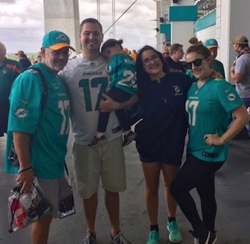
”Dr. Pomper says, “Don’s a good candidate for CyberKnife because his tumor was small and hadn’t spread.” He adds, “There’s a general thought among surgeons that surgery is better for men under age 60 because radiation’s long term effects may cause problems years later, like impotence and incontinence, but that’s not what research is proving. Surgery has long term effects too. CyberKnife has fewer side effects if any. Its pinpoint radiation beams hit only the tumor, dissolving it, so we can give a much higher dose with a lot fewer treatments, leaving healthy surrounding tissue unharmed.”
CyberKnife, considered a standard radiation treatment option for prostate cancer requires only 5 treatments over two weeks instead of 45 or more over several months with other types of radiation.
Don says, “I asked one surgeon what about doing CyberKnife SBRT and the doctor said what’s SBRT and I walked out of his office.”
CyberKnife is the most effective form of SBRT known as Stereotactic Body Radiation Therapy. While some doctors don’t know about it, most do but may not recommend it because their medical center doesn’t have the technology. Plus it’s less lucrative because it requires much fewer treatments.
Some urologists may have a conflict of interest because they have ownership in a conventional radiation therapy center making more money recommending 45 treatments instead of five.
Don was also told by surgeons there’s not enough research on CyberKnife even though it was FDA approved in 2001, has treated hundreds of thousands of patients world wide, is covered by insurance and has a 97-percent success rate for prostate cancer.
Dr. Pomper says, “There’s nearly 20 years of scientific research proving it’s safe and effective. I bring my patients to The CyberKnife Center of Miami because often it’s the best treatment option for them.”
CyberKnife Miami is open to all patients world wide and CyberKnife trained radiation oncologists.
Don says, “From a customer service stand point, CyberKnife Miami is superior. Every time they said they’d do something they did it. If they said they’d call, send an e-mail, set up an appointment they did it. They were on time and walked you thru every step. Their professionalism is impressive from the first call to the last follow up. What I never expected was their radiation therapist, Mario Tobon showing up for my MRI and CT Scan at imaging facilities not part of CyberKnife Miami. When you’re scared, don’t know what to expect and they come to hold your hand, it gives you and your family a lot of confidence and eases your fears. They treated me and the whole family compassionately and that meant the world to me.”
“The whole process was a piece of cake. I’d lay down on the CyberKnife table for each forty minute treatment, relax and listen to my special music play list. It’s fascinating how a machine which makes no noise is so powerful.”
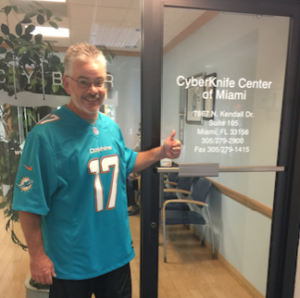
“My side effects were minimal. After my fifth and final treatment, I had a little fatigue and urinary urgency that lasted maybe a day. Nothing bad enough to stop me from working or doing any thing. We’d walk out of CyberKnife Miami and go to lunch while surgery patients I knew of were dealing with pain, bleeding and learning how to urinate again.”
Dr. Pomper says, “Do yourself a favor, before you get any cancer treatment do your research, l learn all your options, get a second opinion from a radiation oncologist and ask about CyberKnife therapy.”Don agrees, “You’ve got to be your own patient advocate. The only person looking out for you, is you. The biggest take away from my experience is what goes on with American medicine today, it’s unreal.”
“Now I educate everyone I can about prostate cancer and CyberKnife. I’m amazed CyberKnife isn’t offered to everyone. After my first treatment I went to the gym and set my personal best bench press and endurance record and then hit the golf course.”
“Cancer changes you. You look at sunsets differently and you don’t sweat the small stuff. I’m a fighter with a positive attitude. I’m fighting for my life and I’m going to win.”
Jeff's Story: Taming Trigeminal Neuralgia
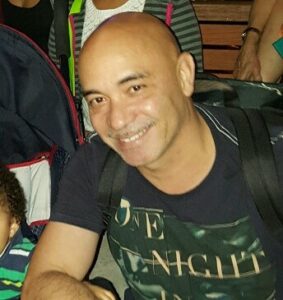
YOU’D THINK BEING TOLD THAT YOU’VE GOT A BRAIN TUMOR AND 6 MONTHS TO LIVE WOULD BE AS TOUGH AS THINGS COULD GET…
That was 15 years ago, and it turned out to be the easy part for 54-year-old Jeff Rodriguez of Tamarac, Florida. Jeff survived the brain tumor, but surgery to remove it triggered a painful, facial nerve disorder called trigeminal neuralgia.
It’s caused by a non-specific triggering of the trigeminal nerve in the head, which can result in constant and/or repeated episodes of severe sudden burning or shock-like facial pain.
The intensity of pain can be physically and mentally incapacitating and last for days, weeks, months, or even years. The attacks often get worse over time, with fewer and shorter pain-free periods.
Jeff says, “The pain is excruciating, seven days a week, 24 hours a day. I had no relief, not for a moment. I couldn’t eat, sleep, drink, touch my face, or let my children touch my face.”
Trigeminal neuralgia is often called the suicide disease because many patients have taken their lives due to the extreme pain.
Jeff says, “The constant pain caused me to lose everything. My six-figure job, my wife, my children, my home. I couldn’t work. I had no physical or mental strength. I went to many doctors and they all told me there was nothing they could do except give me medication. They had me on so many drugs and pain killers that I was zoned out. I was told there’s no solution, there are no treatments available, just keep taking the drugs.”
Jeff and his current wife Sabine could not believe that and were not about to give up and accept it. They searched nationwide for a solution and finally found it with the help of South Florida neurosurgeon Dr. Jack Klem.
“By the time some patients arrive to a specialist, they are usually at their wits end and unaware of the complete spectrum of treatment options available. Trigeminal neuralgia is sometimes under treated with medications and patients may accept that nothing more can be done for them,” says Dr. Klem.
But patients do have other options besides medication, including brain surgery. However, it’s extremely invasive and comes with risks, including brain infection and months of recovery time.
Another treatment option, which is totally non-invasive, is CyberKnife radiosurgery therapy.
Dr. Klem says, “Advancements made in CyberKnife radiosurgery give patients suffering from this excruciating condition the ability to regain control of their lives and often make the pain go away.”
Dr. Klem referred Jeff to the CyberKnife Center of Miami which has extensive experience treating trigeminal neuralgia patients for nearly two decades.
Dr. Klem and a radiation oncologist at CyberKnife Miami meticulously mapped out Jeff’s trigeminal nerve and other sensitive normal brain areas for treatment planning. A single treatment lasting about an hour with the CyberKnife radiosurgery is all it would take.
The CyberKnife system works by delivering high doses of multiple radiation beams to ablate or vaporize the trigeminal nerve with extreme precision and accuracy. Unlike Gamma Knife, CyberKnife radiosurgery treatments are pain free, do not require anesthesia or invasive skull frame placement and are performed on an outpatient basis.
Patients come in wearing their street clothes, lie down on the CyberKnife table, and listen to their favorite CD while treatment is administered. Immediately following therapy, they can return to normal activities.
Dr. James Schwade, CyberKnife Miami’s executive director says, “Patients suffering from trigeminal neuralgia should always consider alternative options to surgery and pain medication, including non-invasive options like CyberKnife therapy.”
Typically, patients need only one treatment. If the pain comes, a second CyberKnife re-treatment may be considered.
CyberKnife has a success rate of 75-to-85 percent with less than a 1-percent chance of side effects, which can include temporary or permanent facial numbness or paralysis.
Dr. Schwade says, “Many people still don’t know about CyberKnife Radiation Therapy for trigeminal neuralgia and we’re trying to get the word out to the public about this non-invasive treatment so they know to ask their physicians about it.”
Jeff says the most frustrating part about all of this was being told by doctor after doctor that the only treatment available is medication, and yet CyberKnife has been around for more than 15 years. Jeff had immediate pain relief with just one CyberKnife session.
“Eighty minutes into the treatment, I had them stop because I no longer felt pain. I thought something was wrong because I didn’t know what that felt like any more.”
“I can do anything now. The day my son touched my face for the first time was the most amazing day in my life because he never could do it before.”
“When I first heard about CyberKnife I was a little skeptical because it sounded too easy, but when I got up from that table, I was crying, I was so happy. It’s a miracle. My heart wants to explode with joy. People used to say, you don’t smile, but boy do I smile now.”
Shaun's Story: Acoustic Neuroma

“CyberKnife gave me the chance to carry on with my life and not miss even one of my kids’ games.”
Getting hit in the head with a baseball isn’t usually considered a good thing, however in Shaun Marquez’s case, it may have saved his life.
“I’m a soccer and little league coach for my kids. I was behind home plate when one of the kids on the team swung his bat and the baseball flew backwards hitting my face.”
That blow set off a constant ringing in Shaun’s ear and sent him to an ear, nose, and throat (ENT) specialist, Dr. Bradford Ress.
“We conducted tests to see what was causing the non-stop ringing, including an MRI, and discovered that Shaun had a slow growing, non-cancerous brain tumor known as an acoustic neuroma. It was located near Shaun’s brainstem and could be dangerous if left untreated.”
The 44-year-old North Miami Beach resident was stunned because he had absolutely no symptoms.
“When you get a diagnosis like that, it’s life changing. I was numb and didn’t know what was going to happen. I sat in my car trying to process it all before I could call my wife Cruz to tell her and my four kids. Cruz was a great, positive support and kept reassuring me everything was going to be alright.”
Dr. Ress advised Shaun of his treatment options.
Surgery to remove the tumor or CyberKnife radiosurgery, a non-invasive treatment, which delivers the highest dose possible of pinpoint radiation, destroying the tumor and leaving surrounding healthy tissue unharmed.
Shaun says, “To me, it was a no brainer. There were too many risks with surgery. All my motor skills could have been affected, the risk of general anesthesia and brain infection. Recovery was a long process with a hospital stay and weeks away from work. CyberKnife was non-invasive. You go in, lie down on the table, listen to music, and the machine does all of the work, moving quietly all around you. Plus it’s less expensive.”
CyberKnife radiosurgery has been used for more than two decades with extremely high rates of tumor control. Dr. Ress says, “CyberKnife is great for treating acoustic neuromas and most patients are good candidates for it.”
Shaun went to the CyberKnife Center of Miami for treatment. All it took was one 45-minute session done on an outpatient basis. A team of doctors worked out his specific treatment plan, including Dr. Ress and radiation oncologist David Huang, MD, PhD.
He had the treatment on a Wednesday morning, coached a little league game that evening, and was back at work Monday.
Dr. Ress says, “For people who can’t take time off work, this is a great option. All our patients have done really well with CyberKnife therapy.”
Shaun says, “If I had chosen to have surgery, I would have had to quit coaching for a while or maybe never again. With CyberKnife, I had no side effects and even drove home after the treatment. My wife wanted to drive and I said ‘No, I feel good.’”
“They take such good care of you at CyberKnife Miami. I wasn’t scared, they were very comforting and explained everything. I also went to their website and watched their video on how CyberKnife works.”
Two years after Shaun’s CyberKnife treatment, his brain tumor is smaller. If it starts growing again CyberKnife therapy can be repeated.
“It’s eye opening when you’re told you have a brain tumor. You think of all the things you might miss. I don’t take anything for granted anymore.”
“CyberKnife made everything so much easier. It eliminates all the stress and risks that could go wrong with surgery. If at all possible, why would anyone choose any other option?”
“CyberKnife gave me the chance to carry on with my life and not miss even one of my kids’ games. I’ve just got to watch out for flying baseballs – or not.” (Laughs)

Sunita's Story: Ovarian Cancer
“I have four kids and I was able to go to my daughter’s college graduation, my older son’s wedding, and see my granddaughter being born.”
When 47-year-old Sunita Chinapana started feeling bloated she passed it off as just getting older. “I had pain on both sides of my body and I actually looked pregnant, but I thought ‘I’m just going through the change of life,’ so I didn’t think much of it. Then I noticed problems lifting my leg.”
A series of medical tests revealed Sunita had ovarian cancer that had spread to her diaphragm and behind her liver. She underwent surgery, removing two tumors that together weighed almost 11 pounds, followed by chemotherapy.
Turns out, Sunita was allergic to chemo drugs, which caused so much pain she couldn’t walk. Her doctor recommended going to Boston and enrolling in a clinical trial using an experimental cancer drug designed to prevent and destroy tumors.
In the meantime, a friend of Sunita’s saw a medical story on a Miami TV news station about the CyberKnife Center of Miami and how the cancer experts there greatly helped another ovarian cancer patient whose tumors had spread.
The CyberKnife is robotic radiation technology. The device delivers high doses of radiation with pinpoint accuracy directly to the tumor leaving surrounding tissue unharmed. The tumors are zapped and shrivel up while you get on with life.
“My friend insisted I go to the CyberKnife Center of Miami, so I did.”
Dr. James Schwade, CyberKnife Miami’s Executive Director says, “The CyberKnife is not a knife at all. It’s a powerful radiation beam that targets and destroys tumors. They gradually dissolve over time. There is no cutting and if tumors come back usually we can treat them again.”
A radiation oncologist at CyberKnife Miami treated three out of seven of Sunita’s tumors.
Sunita says, “I was very confused. I didn’t know what to do so I went back to three of my doctors for a second opinion and they all said CyberKnife would not work for me. Desperate to try anything, I went to Boston for treatment.”
Turns out the experimental drug didn’t work so Sunita quickly went back to the CyberKnife Center of Miami.
Her three tumors that were treated before with CyberKnife therapy were gone. Four others that had developed were then treated and 5 weeks later, they were gone too.
Sunita says, “If I had listened to my original doctors and not gone back to CyberKnife Miami, I don’t think I’d be alive today. I am so excited about my success story that I want to tell the world about CyberKnife technology because I don’t think many doctors and patients are informed about it. My family also jumped on the band wagon, telling everyone we know about The CyberKnife Center of Miami.”
Dr. Schwade says, “CyberKnife radiosurgery is extremely well tolerated and doesn’t have the toxicity of chemotherapy. It’s another tool that is helping us control cancer much like you would diabetes or other chronic diseases. We can help people live longer and yet maintain a good quality of life.”
Sunita says, “I was so comfortable I’d fall asleep during my treatment. They had to wake me up and say it’s time to go home. I had no pain, no side effects, nothing.”
“The whole CyberKnife Miami experience is awesome. From the time you check in, to meeting with the doctors, helping you with your insurance, it’s a walk in the park.”
“I have four kids and I was able to go to my daughter’s college graduation, my older son’s wedding, and see my granddaughter being born. Thanks to the CyberKnife Center of Miami, I look forward to more major milestones in my life.”
Hildegard's Story: Surviving Lung Cancer Thanks to CyberKnife Miami

“I am so grateful. Being sent to CyberKnife Miami was the best thing that happened. Without CyberKnife, my wife wouldn’t be with me right now.”
Hildegard Ireland was busy helping run her family’s Florida resort back in 2008 when, during a routine check-up, her doctor discovered polyps in her throat. Because she was a smoker, Hildegard’s doctor sent her for a CT scan, which revealed a lung tumor.
“I was in absolute shock when the results came back. I had no symptoms. I quit smoking that day.”
Because of Hildegard’s long smoking history, weight, age, and possibly suffering from chronic obstructive pulmonary disorder (COPD), she wasn’t a candidate for surgery. Instead her doctor recommended radiation therapy using CyberKnife technology at the CyberKnife Center of Miami.
CyberKnife therapy, also known as Stereotactic Body Radiation Therapy (SBRT) allows radiation oncologists to treat most small lung cancers and lung cancers that have spread from all other forms of cancer, including liver or breast cancers for example.
Hildegard says, “It was very scary at first, but at the CyberKnife Center of Miami they explained everything so well and it was easy. I just went there and laid down on the table and didn’t feel a thing during treatment. Each session took about an hour.”
Dr. James Schwade, CyberKnife Miami’s Executive Director says, “CyberKnife therapy allows us to deliver the highest dose of radiation possible to a lung tumor or any kind of tumor without damaging surrounding tissue. Before CyberKnife technology we couldn’t treat lung cancer. We can now because this technology can track the tumor as a patient breathes normally. That means the radiation beam only hits the tumor, so healthy tissue is untouched.”
Soon after treatment, Hildegard’s tumor disappeared completely. She thought she was in the clear, but in 2010 another tumor appeared, this one involving a rib.
“Again, I had no symptoms. The tumor was detected during one of my regular follow-up screenings.”
This time, Hildegard underwent chemotherapy and again CyberKnife radiosurgery. It was successful.
When another tumor showed up in 2011, this time in her chest wall, CyberKnife Miami treated it again.
“I’ve always had a very positive attitude, and I think that’s important. Every time the cancer came back, I was confidant CyberKnife would take care of it, I would get through it, and I did.”
Once again, Hildegard’s tumor disappeared following CyberKnife therapy. Once again, another one showed up in a lung in 2014.
“I’ve been treated four times with CyberKnife over the last eight years, and my last scan was clear. I wouldn’t be here today if it wasn’t for CyberKnife. I’m living proof that you can live and survive with lung cancer.”
Hildegard’s husband Harold says, “I am so grateful. Being sent to CyberKnife Miami was the best thing that happened. They’re right on top of it. If a tumor shows up, they take care of it. Without CyberKnife, my wife wouldn’t be with me right now.”
At 81-years-young, Hildegard is retired and looking forward to traveling the US with her husband of 35 years.
She says, “We had never heard of CyberKnife but we learned all about it and now we tell everyone we can about it. We are big CyberKnife Miami advocates.”
Breakthrough treatments like CyberKnife Radiation Therapy and early detection are among the reasons many more people today are surviving lung cancer.
Talk to one of our cancer experts to find out if CyberKnife Miami can help you or a loved one – (800) 204-0455.
Laurie's Story: Managing Cancer Like a Chronic Disease
“I have been cancer-free for over two years now without chemo or any other treatments.”
Since being diagnosed with breast cancer 16 years ago, Laurie has endured a mastectomy, brain surgery, spine surgery, chemotherapy, standard radiation treatment and finally, CyberKnife radiation therapy.
All of this occurred because her breast cancer metastasized to several parts of her body, over and over again.
“I believe with all my heart that CyberKnife saved my life, because tumors can be treated repeatedly if they come back, so basically they’re managing my cancer like a chronic disease. If another tumor pops up, they can treat it with CyberKnife and chances are good that it will go away.”
When Laurie was treated for breast cancer with a mastectomy and chemotherapy in 1994, she thought her cancer was gone and that she had nothing to worry about. That’s why when she suddenly started having severe headaches in 2008, she didn’t think much of it. “I’m a nurse and I know people get headaches for many reasons. It doesn’t necessarily mean it’s anything serious.”
Several months later, Laurie bent over and got very dizzy. “It felt like something was shaking in the back of my head so I went to my doctor and he immediately sent me for a CAT Scan.” Test results showed Laurie had a brain tumor, which had metastasized from the breast cancer.
“Breast cancer runs in my family. That’s why I try to be diligent and get mammograms every year, but I unfortunately missed one year and the next year they found the tumor. I was shocked, yet I shouldn’t have been, considering my family history. If I hadn’t missed my yearly mammogram, perhaps the cancer might have been caught earlier and wouldn’t have spread to my brain.”
Fortunately, the brain tumor was surgically removed and treated with standard radiation; however her neurosurgeon later on felt Laurie needed additional treatments so he also recommended CyberKnife Robotic Radiosurgery Therapy at the CyberKnife Center of Miami.
Dr. James Schwade, CyberKnife Miami’s Executive Director says, “CyberKnife Therapy was not only the perfect choice for Laurie. It was her only choice. She was not a candidate for more standard radiation treatments because it could have detrimentally effected her healthy brain tissue. But the CyberKnife beam and its pinpoint precision, only hits the tumor so the surrounding tissue is unharmed.”
CyberKnife is the gold standard in stereotactic radiosurgery for treating tumors almost anywhere in the body.
It can often be used after conventional radiation with few if any side effects. Plus, if a tumor comes back we can usually retreat it with CyberKnife therapy.
Several months after her brain tumor was treated, more tumors showed up in her spine, liver, and lymph nodes. Each time tumors returned they were treated again with the CyberKnife.
Dr. Schwade says, “We can not only treat recurring tumors, patients can maintain their quality of life while undergoing treatment. Cancer doesn’t have to be a death sentence any more. We can extend patients lives with breakthrough therapies like CyberKnife and that’s what we’re trying to educate the public about. “
Laurie is living proof that with CyberKnife therapy, cancer can be managed like a chronic disease.
Laurie says, “I promote CyberKnife wherever I go. I tell every doctor about it and every person I know or meet. CyberKnife seems to have cured the tumors in my brain, liver, and spine. I have been cancer-free for over two years now without chemo or any other treatments.”
Joe's Story: Comparing CyberKnife to Standard Radiation for Prostate Cancer

“Treatment with CyberKnife is like a day at the beach. Standard radiation for my throat was torture.”
When Joe Aviles was diagnosed with prostate cancer during his annual physical, it came as quite a shock. “I said ‘Wow.’ I had prostate cancer, and I didn’t have any symptoms, nothing, no problems.”
Joe admits he was scared about treatment. “When I talked to other guys I heard horror stories. Doctors took out their prostate or they had too much radiation and now they can’t hold their urine or get erections.”
Joe’s doctor told him all of his options: he could do watchful waiting, surgery to remove the prostate, standard radiation treatments, or have CyberKnife radiosurgery therapy.
“There was no way I was going to have my prostate taken out and with standard radiation, treatment would take over two months, but then my doctor told me about the CyberKnife and that seemed like a better way to go. There was no cutting, no surgery, and treatment was finished in two weeks.”
Joe went to the CyberKnife Center of Miami and met with a radiation oncologist, “He treated it like it was no big deal. He assured me this was a good way to go. He said, “Don’t worry, you’re a young man, and you’ll live to be an old man.”
Joe was a good candidate for this non-invasive treatment because the tumor was small and contained in the prostate.
Dr. James Schwade, CyberKnife Miami’s Executive Director says, “There is a lot of solid research proving that CyberKnife Radiation Therapy is as effective as standard radiation treatments with fewer if any side effects and CyberKnife can be done in 5 treatments over a 10 day period compared to 42 treatments over several months.
Because the CyberKnife’s radiation beam is so precise, it’s much less likely to damage surrounding healthy tissue, therefore resulting in fewer side effects.
Joe says, “I can’t believe what some of my friends with prostate cancer went through, and they didn’t have to. The saddest part is their doctors didn’t tell them about CyberKnife. After talking to the cancer experts at CyberKnife Miami and learning about the CyberKnife, I knew I made the right decision. I can’t believe anyone would choose anything else. It was so easy. I didn’t feel a thing during or after treatment. Most times, I just laid there, closed my eyes, and listened to the music.”
Joe had 5 CyberKnife treatments over 10 days. “It’s been 6 years since my treatments. I’m cancer-free and have no complaints. I wish more men knew about CyberKnife. Don’t just do what your doctor tells you, do your homework, learn all your treatment options.”
Joe has also has been treated for throat cancer, which required chemotherapy and standard radiation. Because it had spread, CyberKnife was not an option, but he wishes it would have been. Here’s how Joe compares the two.
“Treatment with CyberKnife is like a day at the beach. Standard radiation for my throat was torture.”
Joe and his wife Luz go to cancer fundraisers all the time. He says, “It gives me the opportunity to educate people about CyberKnife. If I had to do it over again I’d go to CyberKnife Miami and my friends would too.”
Earl's Story: Beating Kidney Cancer with CyberKnife - Saving Both Kidneys
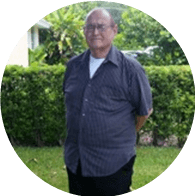
“The treatment was such a simple thing. I had absolutely no side effects and I don’t feel any different today than I did before kidney cancer.”
When Earl Moncada was diagnosed with bilateral kidney tumors and cancer in his right kidney in 2005, he knew exactly where to go.
“As luck would have it I had just seen a story on TV about CyberKnife, a new treatment for tumors.”
Earl’s diagnosis came a short time after the CyberKnife Center of Miami opened its doors and he saw it on the news.
“Thank goodness I saw the news, because my doctors wanted to remove one of my kidneys, but when I heard that, I went to CyberKnife Miami and they said, why would you remove it when we can try to treat the tumor with CyberKnife?”
CyberKnife radiosurgery is a non-invasive alternative to surgery for treating cancerous and non-cancerous tumors anywhere in the body. It delivers high doses of pinpoint radiation directly to the tumor with extreme accuracy and minimal exposure to surrounding healthy tissue. It kills tumor cells and over time the tumor dies. Because it delivers the highest dose of radiation possible, patients need fewer treatments and the control rate is high.
A radiation oncologist at the CyberKnife Center of Miami who treated Earl, says, “Removing a kidney completely or partially is standard treatment for this type of cancer, but often it’s not necessary. In this case with bilateral kidney tumors CyberKnife was the best option for Earl. You can treat the kidney in a shorter period of time and get rid of the tumor without significantly effecting kidney function.”
Earl knows he’s lucky in more ways than one. The tumor in his right kidney disappeared, but six years later another tumor developed in his left kidney.
Earl says, “Imagine if I would have listened to those doctors and had my right kidney removed? I would have had only one kidney and then what would they do? Either I would have been on the list for an organ transplant or maybe even be dead!”
Both of Earl’s kidney tumors were treated with CyberKnife. His last treatment to the left kidney was in 2011 and both kidneys are functioning completely normal. He had zero complications, like he never had bilateral renal cell cancer.
Earl says, “The treatment was such a simple thing. I had absolutely no side effects and I don’t feel any different today than I did before kidney cancer. Why wouldn’t people choose CyberKnife over being cut into?”
Dr. James Schwade, CyberKnife Miami’s Executive Director says, “Another good thing about CyberKnife is if the tumor comes back we can often treat it again.”
Earl’s cancer was controlled and his organs were spared.
“CyberKnife Miami saved my kidneys and my life. If I had listened to my other doctors, I probably wouldn’t be around today,” says Earl.
Earl can’t brag enough about the CyberKnife Center of Miami, “The staff is so nice. It’s scary at first but they explain everything so well, and make you feel completely relaxed. Any chance I get, I tell people about it and they listen.”
Today Earl, a retired airplane instrument repairman, spends as much time with his five grandkids as possible.
“I hope it’s all behind me. The doctors tell me that I’m cured of kidney cancer. I’m so grateful that I went to the CyberKnife Center of Miami and am very lucky I saw that story on TV about the treatment because my doctors sure didn’t tell me about it.”
Mike's Story: Prostate Cancer

“After CyberKnife treatments, it’s like I never had prostate cancer!”
As an airline executive, Mike Cibula frequently traveled the world, but that did not stop him from getting his prostate-specific antigen (PSA) levels tested every year, since age 40. Mike was diligent about it because his dad had prostate cancer.
Mike had a clean bill of health until recently. At the age of 66, Mike’s PSA results came back higher than normal. He was diagnosed with early-stage prostate cancer and had a Gleason score of 7.
His urologist recommended surgery or “watchful waiting” but the Miami Shores, FL resident wasn’t interested in either option so he called a trusted friend who has a lot of medical knowledge.
Mike says, “She suggested I go to the CyberKnife Center of Miami. She worked for a surgeon that often took his patients to CyberKnife Miami to treat all kinds of tumors, both cancerous and non-cancerous.”
Mike had never heard of CyberKnife, but called CyberKnife Miami to check it out. They sent him information about CyberKnife radiosurgery for prostate cancer. After studying it, meeting the staff, and speaking with other patients, he was convinced and chose CyberKnife radiosurgery treatment.
CyberKnife isn’t a knife at all. There is no cutting or anesthesia. It uses pinpoint targeted radiation with missile guidance technology to target and treat tumors.
Dr. Silvio Garcia, the board-certified radiation oncologist who treated Mike at the CyberKnife Center of Miami, says, “Mike was a good candidate for CyberKnife because his tumor wasn’t large and it hadn’t spread.”
Mike says, “It was five easy treatments, about 20 minutes each over 10 days, and I had absolutely no side effects, it didn’t slow me down at all, and I haven’t had a problem since. I don’t feel any different today than before I knew I had prostate cancer.”
Dr. Garcia says, “We’re seeing very positive results with CyberKnife treatment for prostate cancer. More than 90 percent of patients five years post-treatment continue to maintain low PSA levels.”
Surgery for prostate cancer carries an increased risk of incontinence, impotence, and infection. In addition, standard radiation requires 40+ treatments over two to three months compared to CyberKnife’s five treatments over 10 days.
A recent study found more than half of prostate patients who choose “watchful waiting” discovered their cancer was much more aggressive than previously thought. Dr. Garcia says he’s very cautious about watchful waiting. “I believe that being proactive and taking immediate action is best.”
Mike agrees, “Why take the risk of being cut open or waiting if you can have it taken care of quickly, efficiently, and effectively with CyberKnife?”
Dr. Garcia says, “Years of mounting research is proving CyberKnife to be the gold standard for treating prostate cancer, and as more men learn about CyberKnife it will become the number one treatment of choice.”
Today, retired from his job at the airlines, Mike continues traveling the world. He remains cancer-free and tells anyone who’ll listen about CyberKnife Center of Miami.
“They made me feel so comfortable and are so nice. I can’t say enough great things about them. All of the doctors work together as a team. They were all there for my first treatment and they continue to call to see how I’m doing. Their compassion is just incredible. I asked them to send me a stack of brochures and I pass them out to everyone to help spread the word about this amazing technology. I am forever grateful to have learned about CyberKnife and in particular the CyberKnife Center of Miami.”
Ruby’s Story: Living Life to the Fullest while Battling Breast Cancer that Keeps Spreading

“I’ve had stage 4 cancer for years. What amazes me is how good I feel; I don’t feel like I’m going to die.”
Ruby Alexander’s fight with breast cancer began 16 years ago and she’s still going strong!
“When I was first diagnosed, I cried for days.” Because the cancer was caught very early, Ruby was told all she needed was a mastectomy. No chemotherapy or radiation necessary. “So after the mastectomy, I was sure I wouldn’t have any more cancer.”
Five years later, on September 11, 2001 it was back. “I remember that day so well. We heard two planes crashed into the World Trade Center while I was getting follow-up tests, and they found a tumor on my sternum.” It was treated successfully, but a few years later it showed up in her liver and then her lungs. “I was so scared and feeling very sorry for myself but remained optimistic.”
Chemotherapy and standard radiation worked. “No matter how many times it came back I didn’t let it get me down or give up hope.”
Unfortunately it reappeared in her lymph nodes. Ruby’s doctor said the cancer was very slow growing and there was nothing to do except come back in three months for another checkup.
Not liking what she heard, Ruby talked to her neighbor, a doctor who reads CT scans, and he recommended she immediately go to the CyberKnife Center of Miami for treatment. “We never heard of CyberKnife so I looked it up online and found their website and called. They gave me an appointment right away. As soon as they saw my X-rays they said, ‘We can help you.’ We couldn’t believe no doctor had mentioned it to us before.”
Dr. James Schwade, Executive Director of the CyberKnife Center of Miami says, “The CyberKnife is often excellent for treating lymph nodes because it tightly targets the area, can be done in very few treatments, doesn’t affect the surrounding tissue, and prevents cancer from spreading in that area.”
CyberKnife delivers a very high dose of radiation directly to tumors, killing them, and prevents them from coming back.
Dr. Schwade says, “Waiting to treat cancerous lymph nodes could result in the disease spreading to other areas faster, creating more problems.”
Unfortunately, many patients still don’t know about CyberKnife technology and if doctors don’t have it at their hospital, they often won’t recommend it.
Ruby’s advice to anyone battling cancer is, “In the beginning, you think your doctors know everything and recommend the best treatment, then you find out they don’t. I don’t know what would’ve happened if I’d waited. You must be your own patient advocate, ask questions, talk to others, and keep researching treatment options.”
Dr. Schwade says, “It’s on a case-by-case basis, but in Ruby’s situation CyberKnife is very useful and can keep patients functional.”
If the cancer shows up in another lymph node, it can be treated again.
Ruby says, “I’ve had stage 4 cancer for years. What amazes me is how good I feel; I don’t feel like I’m going to die.”
Ruby walks four miles a day, travels often to see her grandchild, and is living life to the fullest.
John's Story: Beating Prostate Cancer
Ric’s Story: Surviving Colorectal Cancer and Liver Metastasis
CyberKnife Gives Hope To More Cancer Patients: “A Life-Saving Treatment Grossly Underused!”
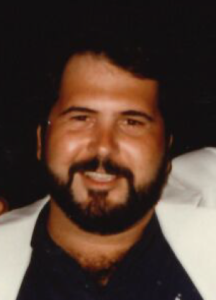
“CyberKnife was my only hope for a possible cure and it actually went better than I expected.”
Ricardo Suarez was enjoying every minute of life traveling the world as a fine arts dealer when it suddenly came to a screeching halt.
“I was having a ball, and then for no apparent reason I began having indigestion and losing weight. I thought it was just part of getting older.”
Turns out it was colo-rectal cancer that spread to his lymph nodes.
“It was a very serious case. I was 52, and the outlook was grim.”
Ric underwent chemotherapy, conventional radiation and surgery, which were successful but then the cancer spread to his liver.
“I had 10 lesions on my liver, big and small. I felt hopeless. My priest helped me through the journey of acceptance. I felt at peace.”
Ric was given six months to live, but a friend insisted he consult with the cancer experts at the CyberKnife Center of Miami.
Dr. James Schwade, CyberKnife Miami’s Executive Director says, “After careful evaluation it was confirmed CyberKnife radiosurgery was a good option for Ric. CyberKnife is excellent for liver tumors. Before this breakthrough technology we couldn’t do what we do now when treating liver tumors.”
The CyberKnife is not a knife at all but the gold standard in radiosurgery for treating tumors any where in the body.
The robotic device delivers a very high dose of radiation directly to tumors so they shrivel up and die without damaging the liver and leaving healthy tissue unharmed.
Dr. Schwade says, “More than a decade of research proves that CyberKnife therapy has a high success rate. We just need to educate doctors and the public about it and we’re getting that done. Cancer patients are starting to ask their doctors about CyberKnife and if it’s an option for them.”
Ric says, “CyberKnife was my only hope for a possible cure and it actually went better than I expected.”
Treatment is done on an outpatient basis. Initially, Ric felt sluggish after treatments but within weeks he began gaining strength and feeling better.
“For the first time, I dared to hope. I thought, maybe I can beat it.”
Ric feels it’s given him a second chance at life.
“It’s terrible more people don’t know about CyberKnife. We should be yelling it off rooftops. I wouldn’t be here if it wasn’t for CyberKnife.”
He’s living proof that CyberKnife is a successful tool for treating tumors, cancerous, and non-cancerous.
José’s Story: Bone Cancer that Spread to the Lungs

“Cancer tried to interrupt my life, but I didn’t let it. I kept a positive attitude. I went to school every day. I graduated and got into the University of Virginia on a full scholarship.”
José Barcardi was filled with excitement anticipating his future and dream of becoming an aerospace engineer.
While finishing his junior year in high school, applying to universities and for college scholarships, he suddenly started feeling pain in his right leg that wouldn’t go away.
José says, “It’s a scary feeling when you have random pain in your body and don’t know what it is. When you’re 17, the last thing you think of is cancer.”
At first, doctors thought it was scoliosis or growing pains. They prescribed anti-pain medication but the pain persisted. José’s parents insisted the doctors do more tests. An MRI revealed stunning, unexpected news. Bone cancer, resulting in a tumor on his pelvis, known as osteosarcoma.
José says, “It was a shock. I thought wow cancer. This is terrible. I could die. This is horrendous.”
Osteosarcoma is the most common type of cancer in children. It usually develops in teenagers around age 15 when they’re growing rapidly. Boys and girls are just as likely to get it. While the cause is unknown, in some cases osteosarcoma runs in families.
The good news – it’s often treatable.
“My doctor said I have an 80 percent chance to live, so I thought okay, let’s get going,” said José.
Treatment usually involves chemotherapy to shrink the tumor, radiation to kill it, and/or surgery to remove it.
In José’s case, surgery wasn’t an option. Unfortunately, the tumor was on both sides of his pelvis, which would require removing his entire pelvis and muscle around it. The treatment regimen they chose was chemo to shrink the tumor and radiation to kill it.
The treatment worked, but unfortunately tumor cells spread to one lung.
This time doctors recommended surgery to remove the lung.
Not willing to accept the news and feeling José was too young to have a lung removed, his parents began researching other treatment options on the internet.
José’s father, Eriel Cabrera, says, “We wanted to see what other treatment options might be available to us when we came across CyberKnife technology at the CyberKnife Center of Miami, so we asked José’s oncologist if it could benefit him.”
The CyberKnife is robotic radiation technology used to destroy tumors. It is a non-invasive treatment that delivers high doses of radiation with pinpoint accuracy directly to the tumor.
José’s doctor, a radiation oncologist told him,“CyberKnife is extremely effective for lung tumors. It’s well tolerated. It does what surgeons do without a knife.”
The CyberKnife robot can follow tumor motion during normal breathing cycles, which makes it perfect for lung tumors.
Dr. James Schwade, CyberKnife Miami’s Executivel Director says, “CyberKnife’s missile guided technology is what makes it great for treating lung tumors. We couldn’t treat them before CyberKnife. It has revolutionized cancer treatment in many ways. The tumors are treated, they dissolve while patients get on with life without affecting the quality of their lives.”
José says, “After CyberKnife treatments I didn’t feel any side effects. I drove myself home, played video games and took walks with mom.”
If a tumor comes back they zap it again. Patients can be treated over and over again.
José’s dad has nothing but praise for the CyberKnife Center of Miami, “The doctors are very good at explaining everything about the procedure and what to expect. The center is a very friendly, comfortable environment and they are so knowledgeable. If you have cancer look for this technology. It’s available and can change your life.”
Today José feels like a winner in all aspects of life.
“Cancer tried to interrupt my life, but I didn’t let it. I kept a positive attitude. I went to school every day. I graduated and got into the University of Virginia on a full scholarship.”
PET scans show José’s lung and bone tumors are gone.
“At first I thought my dreams may not come true but then I thought, no, I will realize my dreams. I will!”
José’s dad says, “He’s a brave, determined young man. We’re so proud of him and the way he handled this. He is going to fulfill his dreams.”
Mark's Story: Treating Acoustic Neuromas with CyberKnife

“I never saw an operating room and my quality of life was unchanged. I couldn’t be happier with how things have worked out.”
Mark’s journey with his acoustic neuroma started years before he knew it.
In 1991 he remembers sitting in his living room listening to music through headphones and thinking that the right speaker didn’t sound right. He assumed that the stereo was broken and he’d just have to replace it someday.
Several months later, Mark woke up to birds chirping outside his window. When he rolled over onto his left side, he noticed the chirping went away, and that it came back when his left ear was uncovered. This was the first moment that Mark realized something was wrong.
Three years later in 1994, Mark’s hearing hadn’t improved and now there was a “plugged up” feeling. He complained about it during a physical exam, so his doctor scheduled an audiogram – his first since grade school.
The audiogram confirmed that he had some unilateral high frequency hearing loss in his right ear. When he looked for reasons, Mark received a variety of answers ranging from too much rock music, a firecracker when he was young, or “just one of those things.”
Mark still wondered about the “plugged” feeling. Could something in his head be causing it? Mark was told that it was probably just a sensation relative to his hearing loss. He wasn’t comfortable with those answers and blamed the issues on a plane flight he had taken while sick a few years back.
Seven years later in 2001, during a routine check-up, Mark mentioned it felt like his hearing had dropped again, so his doctor scheduled another audiogram.
The test confirmed that his right ear had deteriorated in the high frequency range. This time, however, the audiologist scheduled an appointment with an ear, nose, and throat (ENT) specialist who conducted several tests and scheduled an MRI.
Two weeks after his MRI, Mark met with the ENT and learned that he had an acoustic neuroma.
”I reacted like anyone would faced with such news: fear, panic, ‘why me’ thoughts raced through my head all at once,” said Mark. “My wife, Nancy, was a great support and she immediately helped me search the Internet in an effort to better understand this diagnosis. We found a lot of helpful web sites and slowly began to get a handle on what my diagnosis involved and what the options were for treating it.”
Mark consulted neurosurgeons at two different facilities who suggested various surgical approaches with differing results and potential side effects including facial nerve damage and permanency of his hearing loss.
Mark determined that he wasn’t comfortable with their approaches or the risk levels associated with the surgeries, so he decided to seek out another opinion. He went to Stanford where he had a consultation with Lawrence Shuer, MD, professor of neurosurgery and chief of staff for Stanford Hospital and Clinics.
This is where his acoustic neuroma journey took a major turn. Dr. Shuer listened to his overview of previous consults and asked why Mark was not considering treatment with the CyberKnife® Robotic Radiosurgery System. Mark shared what he had heard about the risks.
Dr. Shuer was able to clarify some of the misinformation and brought in Steven Chang, MD, neurosurgeon and director of the CyberKnife Radiosurgery program at Stanford Hospital and Clinics. They pointed out that radiosurgery had been used for more than 30 years with extremely high rates of tumor control.
This new information gave Mark a lot more to think about, but his final decision was made easier knowing that both Dr. Shuer and Dr. Chang recommended CyberKnife radiosurgery, in light of their ability to do surgery. Dr. Chang also put him in touch with several patients who had been treated with the CyberKnife System previously to hear about their experience.
Mark decided to undergo CyberKnife radiosurgery for his acoustic neuroma. The treatment itself was done on an outpatient basis over the course of three consecutive days before Thanksgiving in 2001.
Each day, he would lie on the treatment table and listened to the CyberKnife system move quietly around him. While he took the week off from work and took it easy those three days of treatment, the rest of his life was uninterrupted.
Mark went back to work the next week and resumed his workout schedule the day after treatment.
Mark’s follow-up tests to date have been very positive. At six months, the audiogram showed that his hearing was unchanged and the MRI showed that the acoustic neuroma was darkening and was slightly smaller in size.
After one year, the audiogram actually showed some improvement in speech recognition and in nerve function.
The latter was significant as it suggested that the radiation dosage had been tolerated well by the nerve. The second follow-up MRI showed the acoustic neuroma was essentially the same size, but had turned white again, indicating scarring.
Dr. Chang told Mark that this acoustic neuroma was following the classic progressions of necrosis – or cell death.
”I’m so thankful for having had the opportunity to have been treated by the wonderful physicians at Stanford and to have found a non-invasive technology like the CyberKnife,” said Mark. “When I first started down this path I was resigned to having a very risky surgical procedure and certainly a loss of hearing and a possibility of other deficits. Instead, I never saw an operating room and my quality of life was unchanged. I couldn’t be happier with how things have worked out.”
In December of 2007 Mark had his six-year post-treatment MRI and audiogram. He met with Dr. Chang and reviewed the results, which continued to be very positive. Mark’s acoustic neuroma still showed up as very “dead” and had shrunk further in size.
Overall, the tumor was 25 to 30 percent less in volume compared to the time of treatment. His hearing test showed that there had been no decline since pre-treatment levels with speech recognition at 100 percent in his affected ear.
For more than a decade CyberKnife has treated acoustic neuromas with great success. As of the creation of this patient profile, Mark found his CyberKnife treatment to be successful.
Frank’s Story: Metastatic Adenoid Cystic Carcinoma
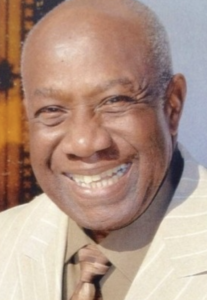
When it comes to keeping the faith, few are as unwavering as Reverend Dr. Frank Glasford and his wife Shirley.
When Frank began having problems swallowing he went from medical center to medical center and doctor after doctor but Frank says they never addressed what was causing his swallowing problem and would only give him a feeding tube so he didn’t have to come back to the hospital as often.
It turns out a cancerous tumor behind his esophagus and trachea was making it impossible for Frank to swallow.
The tumor was a Metastatic Adenoid Cystic Carcinoma.
As a result, Frank was unable to eat and whittled down from 160 to 115 pounds in about two-and-a-half months.
“Not being able to swallow or eat was tough take. Plus I had to sit and watch everyone eat my wife’s wonderful food. She’s a fantastic cook.
Shirley didn’t believe doctors couldn’t do anything to help Frank, “It just didn’t make any sense to us.”
Months later, while praying for some kind of help to come, Shirley heard a commercial on TV about a treatment for tumors at the CyberKnife Center of Miami, “The TV ad said, CyberKnife could treat a tumor anywhere in the body and I knew it was the answer to our prayers.”
The Glasford’s immediately called CyberKnife Miami and came in that same day with Frank’s medical files for a consultation.
Frank says, “A divine intervention took us to CyberKnife Miami and while there we met other patients who were treated. Even a patient who came all the way from England. All we heard were great things and good results.”
CyberKnife Miami radiation oncologist, Dr. Mark Pomper met with Frank and determined the tumor causing his swallowing problems could definitely be treated with CyberKnife Radio-surgery.
Shirley says, “At last we finally had some hope now.”
“CyberKnife was the perfect tool to treat Frank’s tumor because it could deliver the highest dose of radiation possible with pinpoint accuracy, targeting only the tumor, preventing harm to vital surrounding organs like the heart and lungs,” says Dr. Pomper.
CyberKnife therapy also requires a lot fewer treatments than standard radiation which Dr. Pomper says could have easily been 40 treatments.
Instead Frank only needed five, forty-minute CyberKnife treatments. By the second treatment he already had relief and by the third he was swallowing normally and eating again.
“Food never tasted so good. We take many things for granted, like swallowing and eating. I don’t anymore and started gaining my weight back immediately.”
Shirley says, “We never heard of the CyberKnife Center of Miami before and I’m sure we saw their commercial on TV many times, but didn’t pay attention until Frank’s tumor.”
Dr. Pomper says, “CyberKnife is an amazing option that should be used a lot more often. Patients should be given the choice of standard radiation or CyberKnife radiation. Anyone who wants to call us, we’re happy to talk to them and guide them toward the best treatment. We’re here to help.”
Frank couldn’t believe how easy treatment was, “I would just lay there and listen to the music while the machine did all the work. There was no pain or side effects. No interruption to my life.”
Dr. Pomper says, “I don’t think anybody wanted to treat Frank because they were afraid standard radiation would cause more harm. That’s where CyberKnife comes in. That radiation beam is so precise, it can treat hard to reach tumors and spare healthy surrounding tissue. It’s an amazing treatment people need to be aware of and not be afraid of going elsewhere if they’re not getting the help they need.”
If Frank hadn’t been treated with CyberKnife, Dr. Pomper says the tumor would have continued growing, causing more problems and he wouldn’t have been able to live life to its fullest potential.
During the entire time, Frank and Shirley never lost faith. Frank says, “I wasn’t afraid of dying, I just didn’t want to speed it up due to medical negligence.”
“I’m a pastor and I believe this happened for a reason, so I could spread the word about CyberKnife Miami. We tell everyone we know and we pass out their cards and brochures. I have faith and know the Lord, Shirley, Dr. Pomper and CyberKnife saved my life.”
To find out if CyberKnife is the right treatment choice for you, talk to one of our cancer experts at the CyberKnife Center of Miami
305-279-2900 and visit our website www.cyberknifemiami.com
Mike's Story: 13 Years Ago CyberKnife Successfully Treated Lung Cancer
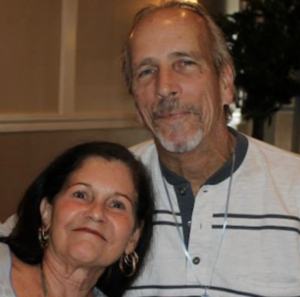
“It’s scary when you find out you have cancer, especially lung cancer, but it’s not a death sentence anymore. It doesn’t mean you’re going to die. I was treated for lung cancer in February 2005 at the CyberKnife Center of Miami and I’m still cancer-free.”
Mike Sluder was 50 years old when, during a routine medical exam, a chest x-ray discovered a tumor in his right lung that turned out to be cancer.
“I was freaking out. My heart skipped a beat every time I thought about it.
Mike’s doctor recommended chemotherapy and surgery to remove the tumor, but as luck would have it, his wife, Sharin saw a TV commercial about CyberKnife, a non-invasive alternative to surgery for cancer and kept it in the back of their minds while researching Mike’s options.
Mike says, “When we heard that TV ad the second time around, we immediately called the CyberKnife Center of Miami. They saw me right away, said we can help you and set up my treatment plan. In the meantime, we went to their website and read everything, including research that showed CyberKnife was very successful at treating lung cancer. I’m just glad CyberKnife was around back then.”
“I had three, one-hour treatments in three weeks. It was even easier than I imagined. I laid on the CyberKnife table, listened to music, relaxed and nearly fell asleep while the CyberKnife moved all around me.”
“That machine is amazing. Every time I took a breath it moved with my breath. That was pretty cool. At one point, I opened my eyes during treatment and the machine was very close to me, I jumped and the machine jumped back. It’s almost like it’s alive, following your every move.” (Mike laughs)
Lung cancer is a frequently treated disease at the CyberKnife Center of Miami.
CyberKnife Radiosurgery, also known as Stereotactic Body Radiation Therapy or SBRT, is becoming the number one treatment choice of lung cancer patients.
Dr. Mark Pomper, CyberKnife Miami’s Medical Director and Board Certified Radiation Oncologist says, “The benefits of this non-invasive treatment are numerous and often far outweigh other options. It’s the only technology that can continually track the tumor as the patient breathes, so radiation focuses only the tumor, sparing healthy lung tissue from being damaged. The CyberKnife also delivers much higher doses and is a more precise radiation treatment than conventional radiation, destroying tumors with little chance of it returning. If a tumor does come back, often we can treat it again.”
CyberKnife Radiosurgery is usually done on patients who are unwilling or unable to undergo open surgery and may be used instead of, or along with, surgery and chemotherapy.
Mike says, “I’d choose CyberKnife all over again. It was completely pain-free and I had no side effects. I went back to work after each treatment. Everybody at CyberKnife Miami was so kind and helpful. They’re excellent at explaining everything and making you feel at ease. My whole family was pleased too and that’s important because when you have cancer it affects the entire family.”
“When I was first diagnosed, 13 years ago, my doctor said we really don’t know much about CyberKnife, do you really want to take that chance? I said yes I do. My wife was my rock through it all. She too insisted on trying CyberKnife. We’re glad it was around back then.”
“I changed my doctor’s mind about CyberKnife. I went back to him for follow-up visits every three months and we saw the tumor dissolve, until all I had left was some scar tissue. Now my doctor uses me as an example and tells other patients, this lung cancer patient denied surgery, had CyberKnife and is still alive.”
“I quit smoking when I found out I had lung cancer.
I feel like I’ve been given a second chance at life. I’m lucky I found out about CyberKnife and tell everyone about it. Many people are stunned and never heard of CyberKnife.”
“I also tell everyone, don’t wait, if something doesn’t feel right, get it checked out. Many people was too long, especially guys.”
“If you do find something wrong, don’t panic. Research all your options. Don’t just do what your doctor tells you to do right away. Take your time making your decision until you find what’s right for you.”
“At 63, I’ve lived longer than I thought I would. If something else pops up, I’ll fight it too. I have a positive attitude and great support from family and friends.”
Find out if you’re a candidate for CyberKnife – call our Cancer Specialists at 305-279-7900 and go to our website now www.cyberknifemiami.com
CHARLES: SURVIVING CANCER ALL MY LIFE “NEVER LOSE HOPE FIGHT TO THE END
“I’ve been battling or I should say surviving cancer for 47 years. I’m 81 now and I was 34 when my fight began. A tumor the size of a football was discovered on my kidney in 1973. It was scary, I thought I was going to die and my wife thought she was going to be a widow. Fortunately the cancer hadn’t spread, the surgeon removed the tumor in one piece and said we got it all, you’re going to be fine.”
Everything was fine until 37 years later when his worst fear became reality. Having had cancer, Charles was monitored closely and in 2010 his Kidney Cancer also known as Renal Cell Carcinoma had spread and he was diagnosed with Stage 3 Pancreatic Cancer.
Since then Charles has fought Pancreatic Cancer twice, Lung, Liver and Lymph Node Cancer in his neck.
In addition to surgery, Oncologists have treated Charles with Conventional Radiation Therapy, Chemotherapy, Targeted Therapy and Immunotherapy which reduced the size of his pancreatic tumor, but not completely. He knew he needed to find something else to battle the tumor and other tumors that may evolve. He started researching and discovered CyberKnife Radiation Therapy also known as Stereotactic Body Radiation Therapy (SBRT) or Radiosurgery (SRS).
Charles says, “I went on the internet and read that CyberKnife could kill tumors without causing any harm to surrounding organs, that it was non-invasive, there were no side effects or downtime and it could be repeated if a tumor came back or another one popped up in my body. I called the CyberKnife Center of Miami and right away I got to meet with the doctor and the whole team. I didn’t have to go through a big, long process like you do at a lot of medical centers. I didn’t have to wait weeks to get in or go through a bunch of more tests or see more doctors. The staff is excellent. I got to know everyone, they’re all very nice and professional. They answer their phones, you get a call back if you need to speak to someone and if you want to talk to the doctor, he will get on the phone and talk to you too. The way they treat you is amazing. They made it all simple and easy.”
That was 4 years ago, since then Charles has been treated with Cyberknife Radiation Therapy for his lung tumor and twice for pancreatic tumors by Dr. Mark Pomper, Board Certified Radiation Oncologist and CyberKnife Miami’s Medical Director
Dr. Pomper says, “Charles is a great example of what modern medicine can do for cancer patients and it is not debilitating. Cancer has spread throughout his body yet he’s gotten amazing control of it since we first saw him 4 years ago using CyberKnife Radiation Therapy and chemotherapies. Back then CyberKnife took care of his lung and pancreatic tumors, but recently another tumor began growing in the pancreas, so we just finished treatment in that area.”
A big CyberKnife advantage is the radiation beams are so precisely targeted, they destroy only the tumor, not the surrounding tissue so if a tumor recurs or another one evolves close to the same area we very likely can treat it again. Because CyberKnife delivers a strong targeted dose of radiation it requires many fewer treatments.
Dr. Pomper adds, “Charles is a walking miracle. When you meet him you won’t believe he has cancer. He should give other patients great hope even when cancer has spread throughout the body, modern medicine can extend life and quality of life for an indefinite period of time.”
Dr. Pomper says today cancer can often be managed like a chronic illness, like diabetes.
About CyberKnife treatment Charles says, “You don’t feel anything during the treatments. I had no side effects, no pain during or afterwards. I have an appetite, my strength is good. I bike, swim and walk everyday. I work my real estate business and invest in the stock market on a daily basis. My mind is still sharp. I feel fantastic.”
Charles’s advice to other cancer patients, “You have to do your own research on all available cancer treatments. Don’t leave any stone unturned. No one told me about CyberKnife, I found out about it myself. I recommend everyone check it out.”
His words of encouragement, “Never lose hope. Keep working, planning, traveling. Continue living your life every day to the fullest. Fight it, fight to the end.”
To find out if CyberKnife can help you or a loved one call The CyberKnife Center of Miami 305-279-2900 and go to our website now to learn more
www.cyberknifemiami.com
Danny's Story: Metatstatic Pancoast Tumor

“It started with a pain in Danny’s shoulder. It wasn’t bad but it was persistent and wouldn’t go away so after a couple of weeks I told my husband he better get it checked,” says Melissa Jo Roger.
“We live north of Lafayette, Louisiana on a farm with cattle and work on deepwater oil platforms for an oil company in Houston so it wouldn’t be unusual pulling a muscle on the job, which is what we thought he did, but soon got heartbreaking news.”
Danny started seeing a doctor in Houston who ordered an MRI because Danny was a smoker. The scan showed a large Pancoast lung tumor in the upper right lobe invading his chest wall, ribs, shoulder nerves, bones and spread to his lymph nodes and adrenal gland.
Pancoast tumors are rare and very aggressive lung tumors. although once considered fatal, today Pancoast tumors are treatable, though not yet curable. treatment for a Pancoast tumor depends on how early it is diagnosed, how far it has spread, the areas involved, and your general state of health. the survival rate associated with this type of cancer is typically 30% to 50% after five years.
Melissa, who most often speaks for her quiet husband says, “Hearing you have cancer is devastating. Especially cancer that cannot be cured and the doctors in Houston did not break it to us gently. They were terrible. That was in October of 2019. Danny was 55 years old. The doctor said the large tumor was inoperable, you must do chemo, 45 days of radiation and you have about a year to live. She showed no compassion. Giving us no other options, but what they chose. They also knew we had good insurance and were sending him for all kinds of unnecessary tests.”
“Danny is very active and did not want to go through a lot of chemo and radiation. Plus, at the time we were both still trying to work and they wouldn’t work around our schedule. They would call at the last minute and say you must come in now. If we couldn’t make it, they would say, “if you cancel, we won’t treat you here.” We were just another number to them it seemed. On top of all that, they lost Danny’s biopsy, so he needed another one. We were fed up and decided to find another hospital and look for other treatment options.”
“My daughter who’s a doctor was also appalled by their behavior and said, we’re going to figure out what treatment he needs and do it with a doctor back home in Louisiana.”
“In the meantime, I was researching on the internet other treatment options for the big lung tumor and discovered CyberKnife Radiation Therapy. Everything I read about it and what patients said was good and it could be done with only 3-to-5 treatment sessions.”
“The Houston hospitals don’t have CyberKnife and the other medical centers I called that do, including one in Lafayette, LA wouldn’t treat Danny because they said the tumor was too big. I called all over the country trying to find a doctor that would treat him with CyberKnife.”
“I was beside myself, I was losing hope, one afternoon coming back home from Houston, I was driving in the pouring rain, I got a call back from the CyberKnife Center of Miami. Gail Suarez, a radiation therapist and vice president of operations said they got Danny’s medical records and could treat that big tumor and it wouldn’t come back.”
“I swear, suddenly it stopped raining, the sky opened up and the sun was shining bright. I felt such an immense sense of peace, it was an answer to my prayers. Gail was so comforting. I knew this was the place to go and it would work so off we went to CyberKnife Miami to get treated and it was all so easy. Danny didn’t feel a thing during treatment and no side effects afterward.”
Dr. Mark Pomper, board-certified radiation oncologist and medical director at CyberKnife Miami says, “A lot of medical or cancer centers that have CyberKnife technology, don’t have as much experience as we have using it, so they get scared when they see a big tumor and think it is not worth treating or are worried about complications. Other doctors feel if it’s incurable why be aggressive?”
“They don’t think it’s worth the risk for patients like Danny, but if you don’t offer the patient anything there is more of a risk. This is what we do all day, every day. We know what can and cannot be treated. We looked at what we could do for Danny, his treatment was successful, and he could go a long time before he gets any complications. It’s defensive medicine.”
Dr. Pomper adds, “We know it’s extraordinarily unlikely we can cure him, but we can give him quality of life while we extend his life. He is doing so well and can for years. It is a different philosophy that is emerging, and it seems to work. If it comes back, we can treat him again. It’s been a couple of years since his first treatment, and you don’t know how many new cancer treatments may come around as we are helping him live longer. yÁu should never just write a patient off.”
Melissa says, “After the first CyberKnife treatment, Danny started with an oncologist in Lafayette for chemotherapy because the cancer was in two lymph nodes and a spot on his adrenal gland. We needed a new biopsy since the Houston hospital couldn’t locate the one they did and it showed, 30 days after the CyberKnife treatment that the cancer was gone. There was no sign of cancer. The pain he had was gone within two weeks of the CyberKnife treatment and hasn’t returned. It was the best Christmas present ever!”
”Danny did six rounds of chemo which killed three cancer spots but six months later they came back. The oncologist in Lafayette recommended more chemo but we chose CyberKnife to treat them. Dr. Pomper treated the two lymph nodes and less than 60 days later a pet scan showed they were cancer-free. He had one remaining cancerous spot on his adrenal gland which is being treated now at CyberKnife Miami. If a tumor or cancer pops up anywhere in his body, we’ll be right back here for treatment.”
Melissa adds, “CyberKnife sounded too good to be true, but I believed in what the patients who were treated had to say and now we’re believers. Even our oncologist in Lafayette and my daughter the doctor were amazed. We tell everyone we can about Cyberknife and to go for it. we can’t believe how many doctors don’t know about cyberknife or don’t tell patients about it.”
“The whole team at CyberKnife Miami is wonderful. You feel at ease with them. They give you confidence, they are like family, an absolute blessing to have found them. They are different, they don’t forget anything, are very conscientious and walk you through it every step of the way. The center is also easy to get to, easy to park and they are always right on time and they even follow up when you get home.”
“Dr. Pomper takes his time with patients. He spent more time examining Danny than all the doctors in Houston combined. He said nothing in life is guaranteed but we’re going to try to give you more time and it will be quality time. Other cancer centers tell you they have something like CyberKnife, but they don’t and the side effects of their radiation can be awful.”
“We fly into Miami and Gail makes sure we have that first appointment of the day. We stay in a nearby hotel and they are really good at helping us with arrangements. We have the routine down and after treatment, we drive to the beaches, Florida keys or key west, something fun.”
“Both Danny and I have all the faith in the world in CyberKnife Miami and even the doctors in Louisiana knew Dr. Pomper’s excellent reputation in the world of oncology.”
“We have recommended cyberknife to other people and they’ve been treated successfully. I brought back a bunch of brochures from CyberKnife Miami and pass them out to others coping with cancer. According to the doctors in Houston, Danny should have died in March. That was a year ago.”
“Danny is not a talker, but he’s a true believer and won’t go anywhere else but CyberKnife Miami. He has hope now. I see him happy and living life to the fullest. They’ve given us hope when we were in despair. The game plan is to take one day at a time and enjoy our family. We just went to Jamaica with the whole family and had a great time.”
“There may come a day when there isn’t more we can do for Danny, but for as long as we can, we will try. We have five children between us and four grandchildren. We’re just simple country people, living a quiet, grateful, blessed and happy life.”
“I tell Gail and Dr. Pomper all the time, God sent you to us, this is the answer to our prayers. I know Danny’s time is in god’s hands, but I want as much time as I can get with him and CyberKnife Miami is giving us that precious gift.”
Natalia's Story: Trigeminal Neuralgia Treatment - A Chance at Life

Family is everything to Natalia Eilers. This happy-go-lucky, filled with laughter, effervescent, stay at home mom loves nurturing and taking care of her two young daughters, 4 and 10 years old. She and her husband were looking forward to expanding their family when facial pain brought it to a screeching halt.
Here’s her story in her words.
Natalia says, “I really wanted to have another baby. We were hoping for a boy, but I started having numbness in my lip. At first I thought it was some sort of allergy but then I started having excruciating facial shocks, 15-to-20 a day that would last about 20 seconds and bring me to my knees. I’d drop to the floor and cry. It was so awful for me but I worried most about my daughters seeing me in such pain, I wasn’t myself anymore and it scared them. It was the worst pain you could ever have.”
“I was diagnosed with Trigeminal Neuralgia and my neurologist put me on an anti-seizure medication which helps with nerve problems. It did help in the beginning but the pain got worse so I was given another medication which made me tired, I was in bed all the time, had to be in a dark room when I had a flare up. I was depressed, losing my hair, always hungry and gained 20 pounds. It changed everything and affected my whole family. It was terrible for my daughters to see me like that, having attacks all the time. They suffered a lot, were very sad and scared.”
“After 8 months on medication I realized I couldn’t live like this anymore. I never knew when I was going to have an attack. A breeze across my face could set it off, so I started doing my own research and watched videos on YouTube to find different options.”
“I saw the surgery for Trigeminal Neuralgia and didn’t want to go through all that cutting and trauma. Luckily I came across CyberKnife Radiation Therapy, a noninvasive way to treat it and it sounded so amazing so I started looking for where it’s done in South Florida and discovered the CyberKnife Center of Miami.”
“I asked my neurologist about CyberKnife and all she said is, CyberKnife is for cancer. When I explained to her it can treat nerve disorders like Tri Gem she said, “I don’t think you’re there yet, just keep taking the meds.”
“I wasn’t going to do that so I called CyberKnife Miami and talked to Mario Tobon, one of their Radiation Therapists. I was so nervous but he said this is definitely something I could try, he explained everything to me so clearly about how it works, potential side effects but that they’ve had great success with CyberKnife for Trigeminal Neuralgia. It sounded too good to be true but I knew the pills would destroy me and I had to do something.”
“I was very nervous, however after talking to Mario at great length he calmed me down and convinced me about the advantages and benefits of CyberKnife. I told my family about it, my husband, mom, dad and the girls and we were all in from the start. After all what did I have to lose except a life filled with pain. They are all so helpful at CyberKnife Miami. From start to finish they worked with me and squeezed me in while my mom was here to help with the kids. They did it all and made everything come together so easily, which is incredible.”
“I met with Dr. Mark Pomper, he’s the chief radiation oncologist and medical director at the center. He was amazing. He gave me a full medical exam and looked at all my scans. The team is so thorough. He explained everything to me in such a simple way. He and everyone there gave me such confidence. Dr. Pomper kept telling me, don’t be so nervous. He said it will probably require only one radiation treatment session, but if you need more, Mario and I will be here for you. He talks in such a nice way.”
“The day of the treatment I was still a little scared.
I went with my husband. They took us into the CyberKnife room and explained exactly how it would go. The process was quick. It took about 45 minutes from the time I laid down on the CyberKnife table and got up. The machine moving around me made me a little nervous at first but I didn’t feel a thing and almost feel asleep. Afterwards I had a little headache, took a Tylenol and a nap, woke up and I was fine. It was amazing.”
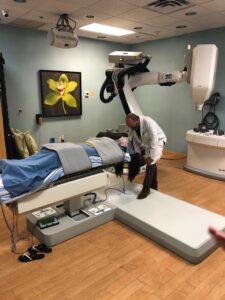
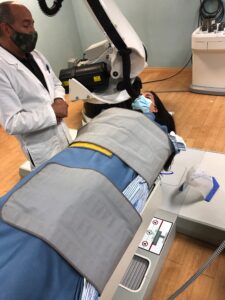
Dr. Pomper says, “Most often we can help patients like Natalia and are happy we were able to help her given the desperate situation she was in. She presented with a difficult case and didn’t have many options. Medications can control the pain but usually only for awhile and they weren’t helping her much. She didn’t want to do surgery and with good reason. Brain surgery is always very risky, it can worsen the problem and the pain can come back. Cyberknife is very effective. By hitting the Tri Gem nerve with pin-point targeted radiation, it decreases the function of the nerve fibers which cause the pain, but doesn’t do any damage to surrounding nerves or tissue in the face. CyberKnife usually only takes one treatment and relief varies but usually happens within a week. If the pain comes back in anyway shape or form we can retreat it, but I haven’t seen that happen.”
“Natalia says, I am so thankful to Dr. Pomper and CyberKnife Miami. At first after the treatment I was scared to sneeze or cough fearing it would set off another pain attack like usual, but it didn’t. I did feel a bit more nerve pain in my face right after the treatment, but after a few weeks I was off the pain meds and I felt nothing. It took me a month to stop being so cautious and realize the pain was not coming back.”
“I’m so grateful, I have my energy and my life back. Before I couldn’t make plans, I was afraid of waking up because I didn’t know what the day would bring. I hated going outside because the wind brushing across my face could start an attack. Now I can exercise and do everything I did before. Living in pain makes you appreciate living with no pain and you no longer take the simple things in life for granted.”
“My girls are so happy again. The day I got the treatment my oldest daughter kept saying, mommy did it work, did it work? My pain was so hard on them. I went from being a happy, laughing person to living in constant pain. To help them understand we created a game and named the attacks. If it was a Thor attack they knew it was really strong pain. If it was a Spider Man attack it wasn’t as strong.”
“I tell everyone I can about CyberKnife. I joined different facial pain groups on Facebook and Instagram. The community is very big, we share our stories and do live talks with doctors answering questions.”
“People mistakenly think Trigeminal Neuralgia only affects older people but I know people who’ve had facial pain since adolescents. This can happen to anyone at any age for many different reasons and unknown reasons, like me. We’re called the Trigeminal Neuralgia Warriors.”
“My best advice to anyone who’ll listen is, you don’t have to live in pain, take pills for the rest of your life or go through risky, invasive surgery. Do your research and check out CyberKnife. It works. If your doctors aren’t helping you, are giving you only one option and put CyberKnife down or don’t know about it, switch doctors. Don’t be afraid. Go to a CyberKnife expert. I’m so happy I did and more people need to know about CyberKnife. I talk to so many people in the Trigem community. They know about the surgery and pills but not about CyberKnife and that has to change.”
“My pain started in July of 2020 and ended when I got CyberKnife treatment in April of 2021. Now that I’m off medication and pain free, we can try to have another baby and we are trying, (Natalia laughs) CyberKnife gave me that gift.”

CyberKnife Miami has treated thousands of patients since opening in 2003. We are the most experienced CyberKnife team in Miami, which is why we can handle the most difficult and complicated cases. call us at 305-279-2900 to find out if we can help you or a loved one and go to our website now to learn more or schedule a consultation – https://www.cyberknifemiami.com/trigeminal-neuralgia/
Keeping it All in The Family: Brother and Sister Mike and Liz’s CyberKnife Story

Mike and his sister Liz have always been close and there for each other, through the good times and bad, especially when both were diagnosed with cancer.
Mike was first. He was treated for prostate cancer at the CyberKnife Center of Miami. That was nearly a decade ago, and since then he tells everyone who will listen, “If you get cancer go to CyberKnife Miami to see if you’re a candidate for CyberKnife radiation therapy.”
Mike says, “It was five easy treatments, about 20 minutes each over ten days and I had absolutely no side effects, it didn’t slow me down at all and I haven’t had a problem since. I don’t feel any different today than before I had prostate cancer.”
Years later when his sister was diagnosed with colon cancer, he thought she too should go to CyberKnife Miami for treatment, but her doctor recommended surgery to remove the cancer and six months of chemotherapy.
Mike says, “I wasn’t going to be pushy, I told Liz, whatever you choose to do, I’m behind you, we’ll get through this together.”
Three years later a tumor showed up on her liver and it was surgically removed. Soon after that, a follow up scan revealed a mass in her pelvic area. The medical term for it is, an intrapelvic mass on a lymph node. Again the doctor recommended surgery and more chemo.
Liz said, “There’s no way I’m doing six months of chemo again, it was hell.”
Mike says this time I asked her doctor, “What about CyberKnife to treat her liver tumor because I knew his hospital had the technology, but he immediately said no. He didn’t say CyberKnife wouldn’t work for her, he just said no, go live your life, walked out, and slammed the door in our faces.”
That’s when Mike says, “I just snapped and took the bull by the horns and told Liz, that’s it you’re going to CyberKnife Miami and getting treated. A hospital closer to where Liz lives has CyberKnife too, but I insisted we go to CyberKnife Miami because they’re the best and most experienced team in town.”
Mike immediately called CyberKnife Miami, they reviewed Liz’s scans and were told CyberKnife was definitely an option for Liz and got her in right away to begin treatment.
Mike says, “I drove Liz there for her evaluation and everyone welcomed her and me again with open arms. I told Liz, you’re in good hands. I’d go to the end of the earth to get her to CyberKnife Miami, and she couldn’t have gotten a better result. I told Liz, CyberKnife was a lifesaver for me, and it will be for you too.”
CyberKnife Radiation Therapy, also known as Stereotactic Body Radiotherapy (SBRT) offers patients a non-invasive treatment option for both primary and metastatic liver cancer with great success. It is used to treat lesions in people who are not candidates for surgery, those who choose not to have surgery, or those who have failed or don’t want chemotherapy treatment.
CyberKnife Miami’s Medical Director and Board-Certified Radiation Oncologist, Dr. Mark Pomper says, “Treating liver cancer with traditional radiation therapy is not an option due to the sensitivity of liver tissue to radiation. CyberKnife’s tracking technology eliminates that risk. The system can continuously pinpoint and follow a tumor’s exact location as the patient breathes normally while on the treatment table, enabling hundreds of radiation beams to attack the tumor from all angles, leaving healthy tissue unharmed. It kills the tumor cells and over time the tumor disappears. If a tumor comes back or another one develops, we can often treat it again, even if it is close to the previously treated area.”
Liz says, “I had five CyberKnife treatments for the mass on my pelvic lymph node, and just like Mike, I didn’t have any side effects other than being tired. I also didn’t have much of an appetite, but Mike took me to breakfast after each treatment and I didn’t get sick or throw up like after chemo.”
“Everyone at CyberKnife Miami is just wonderful to work with,” says Liz. Mario Tobon the radiation therapist, Gail Suarez, she’s also a radiation therapist and vice president of operations. Maria Christina, who handles all the scheduling and insurance, was terrific, and of course Dr. Pomper, he takes his time with you, answers all your questions so you have no fear. You just know you’re in the right place and in the best hands. We tell everyone to go there.”
Gail Suarez says, “It’s not unusual from time to time to see other family members and friends of patients who’ve been treated here because they know CyberKnife works and we treat them the way they should be treated, with great respect and care. We hold their hand every step of the way to make the process as easy as possible, with the least disruption to their lives. Not just our patients but we also help their families feel as comfortable as possible. Liz has metastatic cancer, and she can keep coming back here any time if another tumor shows up.” Gail adds, “It’s too bad she didn’t come here for her liver tumor because we could have successfully treated that too and she wouldn’t have had to go through that second surgery. Any time you can avoid surgery and be treated non invasively, that’s a much easier and safer treatment option, without all the risks of surgery and the downtime you need to recover.”
Liz says, “Gail told me about one patient who’s been coming to CyberKnife Miami for 20 years. She also has metastatic cancer and if a tumor shows up, she comes back for another CyberKnife treatment. Dr. Pomper says there is a one-percent chance the cancer will come back. If it does, I’ll come right back here.”
She adds, “Knowing Mike had CyberKnife treatments and did so well, gave me a lot of confidence, but I thought how could this be, both of us had cancer and we both were treated at CyberKnife Miami. They were so good to me and are still good to Mike many years after he was treated there. We can’t say enough good things about them. CyberKnife saved me. If the cancer comes back and I can’t be treated with CyberKnife, I’ll live with it until God calls me home. I’ve got a lot to live for. I’ve got three children and six grandchildren. I look forward to everyday and being alive.”
Fly Me To The Moon And The CyberKnife Center Of Miami
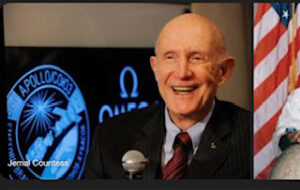
When diagnosed with prostate cancer at 92-years young, NASA astronaut and one of only 24 people who have flown to the Moon and back in record speed, Thomas Patten Stafford wasn’t going to take the ‘watchful waiting approach,’ which is considered conventional wisdom, especially for a man his age.
“I was told by several doctors that watch and wait was the way to go because at my age I was more likely to die of something other than prostate cancer, but I said that’s baloney, I want this taken care of ASAP.”
A smart reaction from this very practical and down to earth NASA astronaut, retired U.S. Air Force General and test pilot, who gives serious meaning to the catch phrase, “the need for speed.” The Commander of the 1969 Apollo 10 mission to the moon remains the fastest man alive on earth. He has logged nearly 521 hours in space, flying six rendezvous on four types of spacecrafts.
As commander of Apollo 10, he flew the first rendezvous around the moon and designated the first lunar landing site.
He was cited in the Guinness Book of World Records for the highest speed ever attained by a human.
“We made it back to earth from the moon in 42 hours, traveling through space at 24,791 miles per hour, or in Mach numbers, that’s Mach 36, and to be even more precise, that’s 0.0037% of the speed of light,” says Commander Stafford.
He adds laughing with a great sense of humor, “The only reason I’m the fastest man alive on earth is because all the other astronauts are dead.”
A primary goal of his Apollo 10 mission was to scout out landing locations and determine logistics for Apollo 11’s mission, which was America’s first landing and walk on the moon, hailed a great success.

But during his mission, an error in Apollo 10’s flight plan caused his Lunar Module to begin spinning out of control, traveling upside down and backwards. Commander Stafford was able to get it under control again and says, “The one thing people always ask me is were you scared? The answer is no. As astronauts, fighter and test pilots we knew what the risks were and we were prepared to do what needed to be done. We knew what all the procedures and tasks were, we just followed them.”
As a prostate cancer patient, Commander Stafford’s mission now was to get his disease and PSA score under control. His need for speed and precision is what he likes about CyberKnife’s technology.
“I had never heard of CyberKnife, but when my urologist told me it had a success rate north of 97-to-98 percent, those were odds I was willing to take. Plus, he said it could get rid of the cancer without surgery or downtime. And because CyberKnife’s beams deliver a more precise and powerful dose of radiation, your treatment is over and done with much faster, in much less time. I scouted out all my treatment options and discovered CyberKnife only required five radiation therapy sessions, one every other day for 10 days and you’re done, so to me there was no other choice. That’s much less time consuming than Proton Beam which requires about 35 treatments or other types of radiation that require 42 treatments, and there was a higher risk of side effects. So, I knew CyberKnife was the path I was going to take.”
While Stafford lives in Satellite Beach, FL, he says, “My urologist recommended I go to the CyberKnife Center of Miami for treatment and said he’d been sending patients there for more than a decade with great success. So I met with the medical crew right away, they explained everything clearly, made me feel so comfortable and without fear or hesitation I began treatment and am very glad I made the choice not to wait. It brought great peace of mind.”
CyberKnife Miami’s medical director and board-certified radiation oncologist, Dr. Mark Pomper says General Stafford made the right decision not to take the wait and see approach.
Dr. Pomper says, “Prostate cancer is a ticking time bomb. You want to kill it as soon as possible. While some prostate cancers are slow growing, many thought to be turn out being aggressive, which is why we don’t believe in watching and waiting at CyberKnife Miami. We say get it taken care of as soon as you can, so you don’t have to worry about it and play the guessing game. What if you’re wrong, and it turns out to be an aggressive cancer, then it becomes much more difficult to treat, much less cure.”
General Stafford says, “The treatment was so easy. The CyberKnife room was cool, dark and quiet. I went to sleep during it and afterwards, I had no side effects. It didn’t affect me in any way. Plus, the entire staff is so knowledgeable and helpful. Very first class. They make it a very good and easy experience for you. There’s nothing to it. I recommend it to other people all the time, in fact I asked them for brochures so I can share this technology and CyberKnife Miami with as many people as possible.”
While Commander Stafford admits that all his space travel has been hard on his body, he says he’d do it all over again, and should the cancer come back, he says, “I’m flying straight back to CyberKnife Miami.”
CyberKnife revolutionized cancer treatment, as Commander Stafford revolutionized space travel.
Commander Stafford says, “Back in the 60’s we were the first astronauts to do everything and had to figure it out along the way, but it was a lot of fun. We made up the rules as we went along and weren’t held down by red tape, like my fellow astronauts and fliers are today.
All of Apollo 10’s objectives were achieved, making way for a safe and successful landing on the moon for the Apollo 11 crew.
And all the Commander’s objectives concerning prostate cancer have been achieved. With prostate cancer behind him, Commander Stafford remains active in the world of space travel and aviation, and he is called upon often for his expertise and guidance. Another mission accomplished with great success!
As for the question, does he think we’re alone in this great big universe he says, “I can’t imagine that we are. As you travel through our massive space and you’re passing by galaxies, other planets, millions of stars and other things you don’t recognize, it’s hard to imagine that there wasn’t life out there before us, is now and will continue to be.”

Choosing CyberKnife Twice For Cancer Treatment

Hearing those dreaded words “you have cancer” just once is tough enough. Hearing it again years later is even worse. Both times, Clinton and Rhonda Ward said “there’s life in cancer.” They were determined to return to the CyberKnife Center of Miami to get treated and to share their CyberKnife technology experience in the hope of helping as many people as they can.
When Clinton was diagnosed with prostate cancer in 2013 his doctor said, “If you were any other 78-year-old man I would say, let us not do anything. Let nature take its course because you will likely die of something else before you die of prostate cancer. But you are not your average elderly man, you are extremely active, healthy, with a young blended family and enjoys the pleasures of living so for you I recommend CyberKnife radiation therapy.”Clinton and his wife Rhonda had heard remarkable reviews and testimonies about treating cancer with CyberKnife, and it’s non-invasive and has a high cure rate.
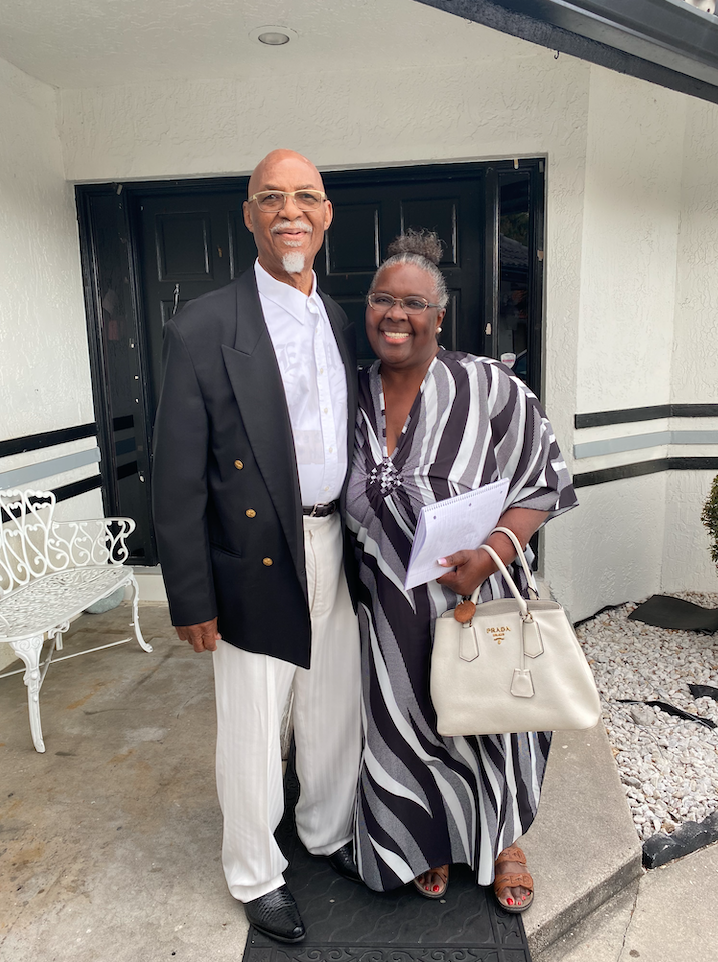
Rhonda wanted to be sure and immediately began researching every prostate cancer treatment option available, because as she says, “Nothing but the best will do for Clinton.” After reading everything she could about surgery, chemotherapy, hormone therapy and other types of radiation treatments, they determined CyberKnife Stereotactic Body Radiation Therapy would indeed be his best treatment option.
It requires only 5 radiation treatment sessions instead of 42 with other types of radiation and because of its missile guided, pinpoint accuracy, CyberKnife can deliver high doses of radiation beams which target the tumor site, leaving the surrounding areas unharmed. That greatly reduces the risk of side effects including impotence and incontinence. That was vital to both Clinton and Rhonda. But especially Clinton, because as Rhonda puts it, “He’s a strong, proud, virulent, southern Black man from Georgia and his natural manhood is crucial to him.”
The next step was finding the best cancer treatment center and doctor that used CyberKnife technology, so Rhonda called the company that manufactures CyberKnife, which is Accuray, located in California.
Rhonda says, “We were prepared to travel from Florida to California and stay as long as necessary for his treatment, but they told us, you don’t need to travel all the way here, there is an excellent CyberKnife center, with one of the most experienced teams right where you live in South Florida. It is called the CyberKnife Center of Miami located on Kendall Drive.”
Rhonda called CyberKnife Miami and as is standard procedure for this team of cancer experts, Clinton got in right away and began treatment.
The treatment was a success. Clinton and Rhonda spent the next decade living life to the fullest, as she says, “And I mean to the fullest in every way. The treatment did not affect Clinton physically nor intimately. All fears were laid to rest as many men fear.”
Rhonda says, “After his CyberKnife treatments I asked his doctor if he’s cured now and he said we’re doctors, we’re not God but you’re doing the right thing by choosing CyberKnife.” Clinton was treated by Dr. Mark Pomper, the medical director at CyberKnife Miami and a board-certified radiation oncologist. Dr. Pomper says, “There is always a chance the cancer can recur down the road. Typically, we do not see that happening, however Clinton had an intermediate risk of the cancer coming back because he had a high PSA score when he was diagnosed. We do the best we can, but we cannot diagnose microscopic disease. His PSA was over 14 so there is a greater chance it may come back. Plus, prostate cancer tends to be more aggressive in Black men.”
Fast forward 11 years and, sure enough, Clinton’s prostate cancer had metastasized. This time he had tumors in the bones of the lower pelvic and spine area.
Rhonda says, “Right away we asked Clinton’s other doctors about CyberKnife treatment and again we were told it would not help. But we knew it would and went right back to CyberKnife Miami and started treatment in January of 2023. Immediately we felt a sense of relief, it eased our stress knowing we were in the best hands.”
She adds, “The medical care and service they provide at CyberKnife Miami is excellent. Like none other. They treat you as if you are the most important person in the world. Like you are the president of the United States or leader of any country. Their bedside manner is excellent and so compassionate. Gail Suarez, the vice president of operations and radiation therapist is amazing, so knowledgeable, kind, and helpful. Radiation therapist Mario Tobon is just a Godsend. They are meticulous with your treatment plan. And Maria Kristina Borgen, who we spoke to first, scheduled our appointments and made the entire process as easy and simple as possible. No cancer center works with you like they do. And God bless that CyberKnife robot. After the second day of treatment, the pain Clinton felt from the tumors had already eased.”
Rhonda says, “Clinton’s 88 now and being married to an older man I cherish every moment and take nothing for granted. We celebrated 23 years of marriage and the CyberKnife treatments never affected him. He is still a vibrant man enthusiastic to have a meaningful way of living.
Clinton is on hormone therapy now to help stop the cancer from spreading and that of course is like a medical castration, but we had to balance the scales and choose intimacy or life, we choose life.”
“We have taken all the steps we can to target the cancer and he is doing great. Even his doctors, including his oncologist who told us CyberKnife would not work, are impressed with his results. Today his PSA level is less than 0.02 and his scan results are excellent. We were not expecting any more cancer, but we wasted no time getting back to CyberKnife Miami for treatment.”
Clinton’s twin brother was diagnosed with prostate cancer at the exact same time. Despite their efforts to persuade him to choose CyberKnife, he chose chemotherapy and died of prostate cancer 3 years later. Clinton and Rhonda believe he would be alive today had he been treated with CyberKnife.
 Rhonda adds, “I do not have any stock in CyberKnife, but Clinton and I tell everyone about this technology. My friend’s son was just diagnosed with prostate cancer, and she said you are always talking about CyberKnife, tell me more and now her son is being treated with CyberKnife in Nashville. I am from the Bahamas and our Prime Minister died of prostate cancer it made me determine to share the experience of the excellence of Cyberknife treatments for prostrate and bone cancer. There must be a broader platform, others can help us spread the word.”
Rhonda adds, “I do not have any stock in CyberKnife, but Clinton and I tell everyone about this technology. My friend’s son was just diagnosed with prostate cancer, and she said you are always talking about CyberKnife, tell me more and now her son is being treated with CyberKnife in Nashville. I am from the Bahamas and our Prime Minister died of prostate cancer it made me determine to share the experience of the excellence of Cyberknife treatments for prostrate and bone cancer. There must be a broader platform, others can help us spread the word.”
The good news is, as more people hear about CyberKnife cancer treatment, they are asking for and even demanding it. As more doctors learn about it, including those in medical school, they are recommending it.
There are more than 30 years of research proving CyberKnife’s safety and effectiveness, so the technology is becoming more readily available as more cancer centers are adding CyberKnife to their arsenal of cancer fighting tools.
As for Clinton’s prognosis, Dr. Pomper says, “He’s 88 and has multiple areas of metastatic disease, we can’t cure it, but we can slow it down and help him live longer and without pain.” Dr. Pomper adds, “If you saw him, you would be amazed. He is always perfectly dressed. He does not look frail or old he really looks good.”
Rhonda says, “I feel God has allowed my husband to go through cancer a second time to live and tell people about CyberKnife. We have much to be grateful for. This is a day of rejoicing and celebration. This cancer is stage 4 but when other doctors said CyberKnife will not help Clinton, and even family members and friends told us not to do it, I thought oh no, if he is going to die, we are going down trying, and we have no regrets. Our God is FAITHFUL with a capital G. We are not here forever but give me some extended years. You must find the right people, positive people like Dr. Pomper and his team at CyberKnife Miami who are going to work with you.”
To find out if CyberKnife cancer treatment can help you, call our team at 305-279-2900. Our promise is to get you treated as effectively, safely, quickly and easily as possible, and we do it with great compassion to our patients and their family. We will hold your hand every step of the way.
Just for fun take a look at this video on our YouTube Channel and see Rhonda, turn the camera on the CyberKnife team for a quick interview with Gail and Mario.
FOLLOW US ON FACBOOK – YOUTUBE and INSTAGRAM FOR ALL THE LATEST MEDICAL NEWS CONCERNING CYBERKNIFE FOR CANCER TREATMENT
“I can’t believe I feel so good. Life is great despite living with metastatic cancer for 20 plus years!”

Ruby – Real Patient
To learn more about what to expect with the CyberKnife procedure or to schedule a consultation, please call CyberKnife Miami
at (800) 204-0455 today.
